
A life less ordinary KPMG, Vanguard, Weebet and more on breaking the LatAm glass ceiling
Poker reborn
How DraftKings, Rush Street and more gave a dead vertical the kiss of life
Panic stations
Sweeps, crypto and futures cause US mayhem


A life less ordinary KPMG, Vanguard, Weebet and more on breaking the LatAm glass ceiling
How DraftKings, Rush Street and more gave a dead vertical the kiss of life
Sweeps, crypto and futures cause US mayhem
CEO Neal Menashe on Super Group’s journey from the dotcom era to the NYSE
Also featuring: Betfred, Betsson, Betsul, Codere, GG Poker & more
30,000 DELEGATES
The political environment across the US is the hottest I can recall since Caesars and the American Gaming Association were waging war on PokerStars back in 2013.
And the root of the problem now, is the same as it was back then – protectionism and fear of a new more technologically-advanced competitor. For PokerStars then, read VGW now. One lawyer argues it’s illegal and another argues that it is legal. There is one difference: Caesars wasn’t arguing that you should outlaw online poker, just that PokerStars should not be licensed after operating when Caesars considered it illegal.
This intra-industry bickering has created a political environment that is extremely unhelpful to the industry as a whole.
In legislative hearings up and down the land you will hear US lawmakers failing to distinguish between sweepstakes operators and unlicensed (but otherwise regular) online casino operators. But by vilifying both, the argument for regulated online casino just gets harder. It’s not even clear if regulators understand sweepstakes casinos.
Ironically, you’ll find most consumers are a lot more savvy than their representatives. As I write, sweepstakes operators are closing down in New York in expectation of a ban. On a Reddit forum one customer warned: “This will just push everyone to offshore crypto casinos.”
The protectionist nature of the US gambling industry is such that almost any technological innovation is stifled at birth. While everyone recoils at the mere thought of any form of federal intervention, iGaming is unlikely to get the big bang moment that the Supreme Court’s repeal of PASPA provided for sports betting.
And yet… the innovation in the startup community is immense. A lot of it will all be for nothing. What a waste.
Steve Hoare, Editor, SBC Leaders

The SBC Leaders Magazine is brought to you by SBC - Sports Betting Community: Editorial Team: Andrew McCarron, Craig Davies, Ted Menmuir, Joe Streeter, Conor Porter, Charlie Horner, Jessie Sale, Fernando Noodt Molins, Callum Williams, Viktor Kayed, Martyn Elliott, Lucia Gando, Jessica Welman, Ted Orme-Claye, Steve Hoare, Justin Byers, Kieran O’Connor, Christian Lee, Tom Nightingale, Elisa Marcante, Ana Maria Menezes, Ricardo Assis Sales Team: John Cook, Rasmus Sojmark, Alyona Gromova, Conall McCabe, Jan Kowalczyk, Richard Deacon, Bob McFarland, Craig Brown, Juan Ospina, Ed Young Creative Lead | Design and Layout: Jessica Camilleri
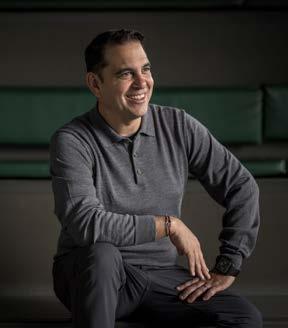
Betsul CEO Fernando Garita reflects on a life in and outside gambling; plus leaders on the move
CEO Neal Menashe talks us through the past, present and future of the Betway operator



14 The Hot Topic: The triple threat of sweeps, futures and crypto
Regulators and regulated are up in arms Stateside. Justin Byers investigates
20 Feature:
Brazilian careers focus Female gaming execs discuss their long and winding journey
© 2025 Sports Betting Community Limited. All rights reserved.


90 Final word: A word from Ras SBC Founder on the beautiful synergies to be found in football and business
All content in this publication, including articles, photographs, and other materials, is protected by copyright under the Copyright, Designs and Patents Act 1988. The copyright in all materials in this publication is owned by Sports Betting Community Limited or its licensors. You may not reproduce, distribute, or otherwise use any of the content without the express written permission of Sports Betting Community Limited (SBC), except as permitted by law. For permissions or licensing inquiries, please contact sales@sbcgaming.com.
The views in the publication are not necessarily the views of SBC or those of the advertisers. Although every effort has been made to ensure the accuracy of the information contained in this publication, SBC cannot be held responsible for any errors it may contain. In no event shall SBC be liable for any direct, indirect, incidental, special, consequential, or exemplary damages, including but not limited to, damages for loss of profits, goodwill, use, data, or other intangible losses (even if we have been advised of the possibility of such damages), resulting from the use or the inability to use the material contained in this publication.
Produced and published by Sports Betting Community Limited
REGISTERED ADDRESS: SBC, Riverbank House, 1 Putney Bridge Approach, London, SW6 3JD TEL: +44 (0) 203 983 7050 | EMAIL: sales@sbcgaming.com | WEB: www.sbcgaming.com & www.sbcleaders.com
29 Column:
The luck of the Irish
Joe Streeter looks at the enduring power of certain slots themes
30 Feature:
The rebirth of poker
Can the surge of love for online poker fuel a concerted legislative effort?
34 Interview: Wazdan CCO Andrzej Hyla
Chief Commercial Officer reports on the supplier’s progress in North and South America
38 Interview:
Codere Online CEO
Aviv Sher
Big in Mexico and Spain but at risk from a Nasdaq delisting. Sher reveals all
42 Interview: Gamomat MD
Robert Kocher
On a brand new suite of games designed for Brazil and the US
46 Interview: Greentube team
Michael Bauer, Ben Sutherland, and Wilson Francisco discuss the challenge of launching across two continents
51 Column: A new pecking order
Ted Menmuir has spotted a changing of the guard in the UK
52 Feature: Change in Chile?
Lawyer Carlos Baeza on the passage of online gaming legislation
56 Feature: The great AI debate
Betfred, Betsson and more discuss the way AI is revolutionising operations
60 interview: Soft2Bet CPO Yoel Zuckerberg
On the bold decision to launch a sports betting platform in DraftDueldominated US market
65 Column: Payment politics
Trump is not the only politician that we should be watching, says Ted Orme-Claye
66 Feature: Crypto dream or nightmare?
Ted Orme-Claye investigates the opportunities and threats of Trump’s enthusiasm for crypto
71 Column: Embracing sweepstakes
Charlie Horner on affiliates’ hunt for new revenue
72 Interview: Betting Ladies CEO
Val Martinez
Affiliate on a new market opening up in post-PASPA US
78 Thought Leadership: mkodo Commercial Director
Will Whitehead on harnessing the marketing power of geolocation technology
83 Column: The problem with stigma
Steve Hoare on why politics should be kept far away from treatment
84 Interview: DraftKings’ Lori Kalani
Chief RG Officer on her busy first year at DraftKings
88 Feature: North vs South deposit trends
SBC Advisory and Optimove Pulse deliver key industry insights, analysed by Anton Kaszubowski

JD invited me to join when the company was first starting in the late 90s, with interest from American companies to work outside the US, and at a time where sports betting was far from what it is today. I first started working the phone, taking bets for the wagering department, from midnight to 7am. Soon after, Betcris started growing and expanding into other countries, and I started making business with people from the industry. But I was still very young and I looked young. People would ask me if my Dad couldn’t make it to the meeting.
At a time when everything revolved around landbased, slot machines and such, we were like the crypto bros of today. We even had to help clients open their email accounts to start wagering with us.
Forging regulations
With Betcris, I attended the very first Peru Gaming Show in 2003. I would later work with other industry people in the local regulation, alongside the late Manuel San Román Benavente.
I later also worked in Colombia with (Fecoljuegos President) Evert Montero Cárdenas in pushing their regulation, and helped other countries and markets during my career. That has allowed me to have
The Betsul CEO is one of the most familiar faces in the Latin American gaming community. As a young man he studied Agronomic Engineering at the National University in Costa Rica but the betting and gaming industry found him at a very early stage of life through his cousin, the CEO of Betcris JD Duarte

friends pretty much everywhere in LatAm, who will welcome me without hesitation.
In 2011, we went to Macau for our first industry show in Asia. We thought everyone spoke English, but found out the hard way that we were wrong. I ended up running around with a bunch of post-it notes I asked the hotel receptionist to write, with the things I needed to do and places I needed to go.
In the Philippines, I had a similar experience as I arrived expecting English to be enough, only to find out there are dozens of dialects in the country. I had to go back and find a translator before going back to finally do the training we were intending to do.
From one family to another
I started coming to Brazil in the late 2010s, and eventually met Betsul and its people through my friend [Vibra Gaming CEO] Ramiro Atucha. In a context where the market was booming, I made a very tough decision and left Betcris to become Betsul CEO in 2023. But I have always loved a challenge.
Here I have had a great adaptation, mainly thanks to this great Brazilian family from all around the industry. That is why I am always open to sharing my knowledge with all my colleagues and helping them in any way I can.





Kip Levin has been appointed as the new CEO of security and compliance firm GeoComply He replaces co-founder Anna Sainsbury, who becomes Executive Chair.
Sun International has appointed the former William Hill and Betsson CEO Ulrik Bengtsson as Group Chief Executive.
Svenska Spel has promoted Amäni Radwan to the role of CFO in place of Eva Stoppel, who steps down after six years to focus on her board assignments.
I wish the day was longer so I could have time to do more things.
I have liked motorbikes since around 2005 - mostly Enduro, to go out to the mountains and ride around. I like hitting the road around São Paulo and getting to know the area like that.
Also, as a Costa Rican, I have surfed since I was 12-years-old. Today, my eldest daughter – who’s 13 –also likes it, so I get to share that every time I am back in the country.
More recently, I started sniper shooting. But I also used to practise full-contact karate, and even played handball in my college years, and even paid for my tuition with a sports scholarship!
ZEAL Network is on the hunt for a new CEO to replace Helmut Becker who leaves when his contract expires at the end of January 2026. Andrea Behrendt has been appointed CFO, replacing Sebastian Bielski.
Aristocrat CTO Andy Hendrickson has resigned and accepted a role at an undisclosed competitor.
Yolo Entertainment has made a trio of promotions with Ashley Abela Hardy becoming CTO, Shane Anderson taking over as chief brand officer and Laura Nash assuming the newly created chief data officer role.
Las Vegas Sands CEO Rob Goldstein is set to leave with COO Patrick Dumont taking over.
Entain CEO Gavin Isaacs left the company and was replaced by Chair Stella Davids on an interim basis. Lachlan Fitt, deputy CEO and CFO of Entain Australia, and Cameron Rodger, MD of Entain New Zealand also departed.
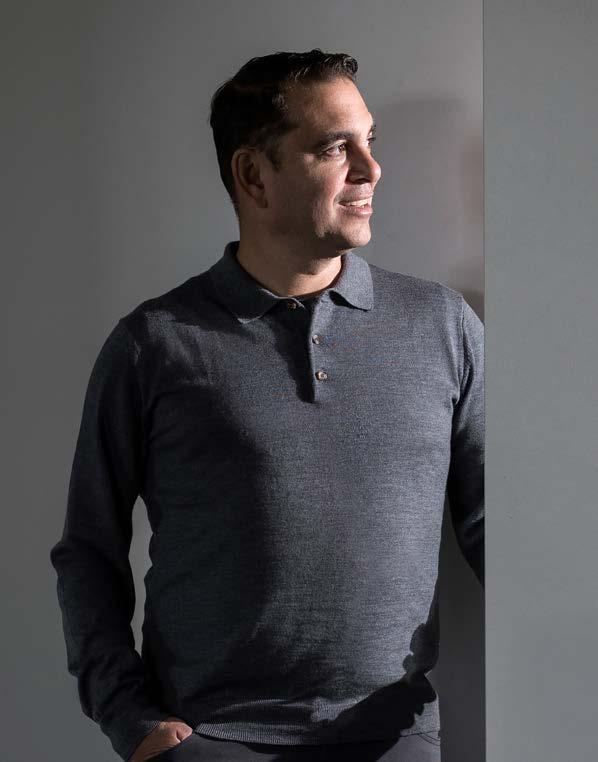
After an overhaul of markets, staffing and technology Super Group CEO NEAL MENASHE says the company is moving into its shiny new office in rude health
Words by STEVE HOARE
Super Group, the holding company that runs Betway, Spin Palace, Jump Man and other brands, has slimmed down during the past year-anda-half. It has pulled its sports betting operation from the US, and retreated from Portugal, France, Belgium and India.. When the company floated in 2022, it had 22 licences, now it has 17.
The Betway operator has also shed 1,000 staff during that time, with just over 3,000 now employed by the group. Yet during 2024 net revenue (excluding the US) has grown 18 per cent to a record €1.66bn. Adjusted EBITDA (excluding the US) has shot up over 50 per cent to €391m. And that momentum has continued into Q1.
“It’s not about chasing revenue at all costs,” says Chief Executive Officer Neal Menashe. “And I think that’s key. If you chase revenue at all costs, the profits will come, but sometimes they don’t. You have to be super-efficient and chase your revenue with efficiency.”
Menashe says the word efficiency –or efficient or efficiencies – 16 times during our 45-minute interview. If you look at a word cloud of our conversation, the most frequentlyused words are: people, business, Africa and casino. It’s a pretty good indication of where Super Group is at.
The headline news from Super Group over the past year has been throwing

the towel in on US sports betting. When Super Group was marketing its initial public offering in 2021 all the talk was of the potential of Betway to take on the US market – it has been a steep learning curve for the Super Group team.
First off, he says, you now have two operators – DraftKings and FanDuel – accounting for around 80 per cent of the market. But that’s not the only issue.
“The difference with the US market compared to other countries is you’ve got third parties and land-based partners that you have to pay access fees to,” explains Menashe. “So the volume of revenue – net win – you have to do in these businesses is far more than other countries. But once you reach that scale, then you’re covering all your costs.”
Since withdrawing Betway from the market and focusing resources on its iGaming brands Jackpot City and Spin Palace, Super Group has enjoyed a record Q4.
“We’ve had great momentum into quarter one, 2025. But for us, it’s actually that the business is now covering its costs - it’s not just covering marketing,” says Menashe.
“So we just have to achieve more scale and start growing a bit more. We look at it every month, every week, every day – as we do all our numbers –and it’s about hitting those KPIs.”
During the past five years, Super Group launched in a lot of new markets. However, it has learned that there is no one-size-fits-all approach in regulated markets.
“You think you just take the software, you get it regulated, which is a job-and-a-half. And then it just works. But there are different regulations - every country is nuanced in what the software has to do,” says Menashe. “So I think we took on too many countries.”
Which meant Super Group withdrawing from Portugal, France, and Belgium, where Menashe couldn’t see “a path to making a lot of money”. It also pulled out of India in October 2023, when the government slapped a 28 per cent goods and services tax on turnover.
“We were piling all the resource into these markets, when we should be piling into the markets where we are super-profitable and can make even more money,” he concludes. One problematic market remains.
“Germany was a really big market for all of us - for the whole industry,” says Menashe. “And they just overregulated it.”
“The problem is the black market is just really big and no one does anything. You can’t punish the companies who are paying the taxes just because you can’t find the companies who aren’t… but the truth is you probably can find them if you assign a taskforce to it.”
He says it is the only market that upsets him but he is trying to make it work.
“We are still operating there but our casino has not launched there yet, because we had to split our wallets out,” he continues. “It’s a bit complicated technically but I think we’re almost there. But again, we will make money but the black market operators are the ones who are really cleaning up.”
Menashe founded Win Technologies with his brother Gavin and a bunch of University friends in 2001. The brothers had both worked at Big Five accountancy firm Arthur Andersen and wanted to get into online gaming.
“The premise was: you took a one-sizefits-all dot.com product – in those days provided by Microgaming. We then came across other Microgaming operators, we absorbed their teams, we took over their brands and then we divided and conquered the world,” he summarises.
The relationship with Microgaming became closer when the supplier’s owner Martin Moshal invested in what, ultimately, became Super Group just under a decade ago. However, the companies were never linked, they just shared an owner. Microgaming also owned Betway’s sports betting software provider Apricot, which Super Group acquired in May last year for €140m.
There were three big changes between now and then. The company launched Betway in 2012 – “we tried bingo, we tried poker, we tried all of it, right? And actually, what resonated with us was the sportsbook” – then the smartphone changed the entire iGaming industry, and then, in October 2020, Daniel Burns of Oakvale Capital rang.
Burns wanted to introduce the Win Technologies team to former Goldman Sachs partner and ex-NFL VP Eric Grubman and his business partner John Collins, an experienced sports business executive. They had a Spac called Sports Entertainment Acquisition Corp that was looking for an acquisition to float on the New York Stock Exchange.
Burns hosted a Zoom call to introduce Grubman and Collins to Menashe and COO Richard Hasson. “We got on really well,” says Menashe.
Things soon progressed and by January 2021, the terms of a deal were thrashed out that valued the new company at $4.7bn.
Super Group was formed from a collection of Win Technologies’ assets across a number of different verticals – “it was something like 100 companies that brought together all the different pieces of the puzzle, so the work was super-heavy lifting,” recalls Menashe.
All of this was done during the pandemic, which Menashe says, actually made things easier with bankers and lawyers on both sides of the Atlantic using Zoom for the first time.

“
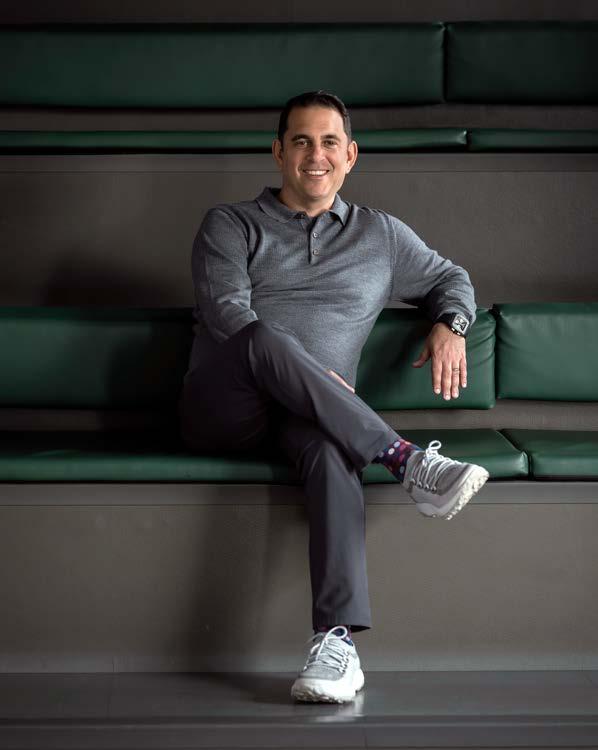
We had to learn how to operationalise the business as a listed company. And you have to get people who are on that journey with you
The end result was Super Group listing in 2022. But the hard work did not end there.
“We had to learn how to operationalise the business as a listed company,” he explains. “And we had to find people to come on that journey with us – one of those people is Eric Grubman.”
“We never could have got to this point without Eric,” says Menashe. “It’s a different world without Eric.”
Growing up in public has not been easy. When numbers went down, Chairman Grubman supported them but efficiencies had to be found. That was what 2023 and 2024 were all about and now Super Group is growing again.
One of the success stories of the past year has been Africa, which grew from 34 per cent of total revenue to 43 per cent during 2024over €700m.
Despite the core management team hailing from South Africa and the company’s call centres and back office being based there, the company did not operate on the continent until 2014.
“We took our dedicated team in Johannesburg and said, ‘Now you do Africa’,” explains Menashe. “They built their own software from the bottom up, and it was difficult in the early days. It’s a different business due to the volumes involved and the way processing goes through the telcos, etc.”
“The most important thing,” continues Menashe, “was the worldwide marketing of Betway. The football and basketball, for example, resonated across Africa because they watch it on TV all the time. So we had a really strong brand presence. Now we find
that, as we open new African markets, we’ve still got this brand presence and what we need to do is get the product localised for each market.”
Super Group is one of the premier operators on the continent with podium positions in countries such as South Africa, Ghana, Zambia, and Tanzania.
“The metrics there have to be right with the local taxes. This is the story of gaming across the world,” says the Super Group boss. “And you can’t invest in marketing in every single country. You don’t have the bandwidth, which is like one of the reasons we didn’t do Brazil.”
Super Group applied for a licence but when it studied the software and the huge amount of time that it would need to adapt to the regulations, it decided it wasn’t worth it.
“If we did Brazil, we would have to give up somewhere else and we would have to take the marketing budget and give it to Brazil. Well why? If we’re not even the market leader in some of these other countries surely it’s better to spend the money on marketing and improvements on the product. With this we get huge operational leverage. The UK is one of them. We have a small market share there relative to – let’s say – Flutter, which owns a lot of brands. But we can grow easily - and that’s really the point.”
“I think we’ve learned our lesson. It’s not one size fits all,” he sighs. “Maybe with hindsight in the US, we should have just done iGaming first, but listen, at the time everyone was going there. Three, four years ago, the world was a different place. So have we learned our lessons? Yes. If we had never been in the US, would we have noticed these other countries not performing as they should? Probably not.”
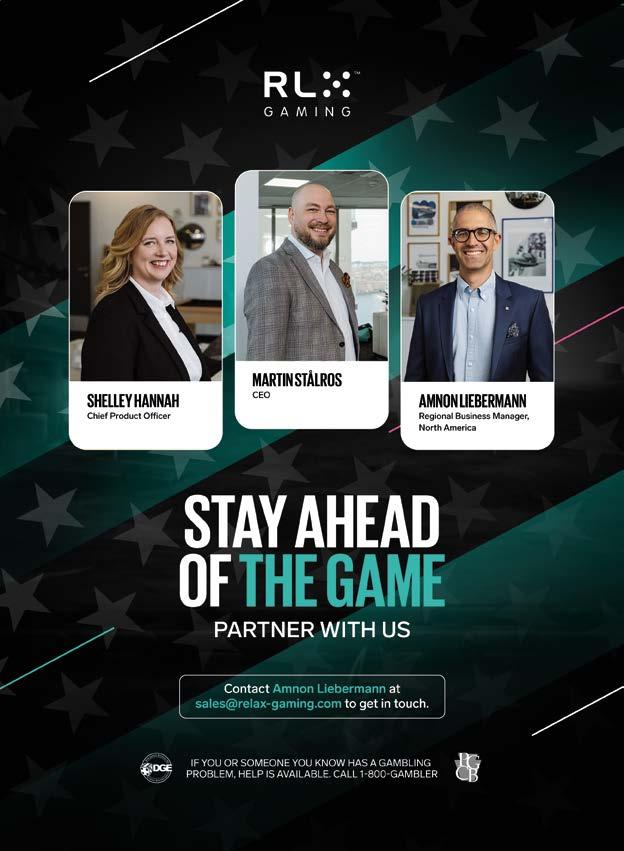

Crypto, Sweeps and Futures have thrown the US market into disarray as regulators and regulated operators struggle to digest the nature and impact of these new products and technologies
Words by JUSTIN BYERS
Just when gaming regulators were starting to get to grips with illegal offshore operators such as Bovada and Betonline, a new generation of operators has appeared, which has blurred the boundaries between what is legal and what is not. The result is a regulatory confusion that has lawmakers and regulators twisting themselves in knots.
The arrival of sweepstakes casinos has had the biggest impact on the market but President Trump’s enthusiasm for cryptocurrency [see feature, p.72] and event contracts has further queered the regulatory pitch.
Regulators in some states have taken steps to combat the operation of unlicensed online sweepstakes casinos, which they see as circumventing their gaming rules and standards, but there are plenty of lawyers who will tell you that the new product is completely legal.


While regulators such as those in Maryland and West Virginia have sent cease and desist letters to some sweepstakes operators, this has led to confusion among lawmakers and the public.
“For the typical so-called offshore operator, cease and desists are not really effective. But for companies that are sincerely worried about legal compliance [such as some sweepstakes casinos], they are more effective,” says Ifrah Law founder and Managing Partner Jeff Ifrah.
The issue has led to some confusion in legislative hearings as lawmakers seem unable to distinguish between sweepstakes operators, which claim to be legal and offer regulated-standard KYC
and player protection policies, and illegal online casinos, which do not.
States that have taken steps to stunt the growth of sweepstakes casinos include Connecticut, Maryland, Michigan, Mississippi, New Jersey, New York, Florida, and West Virginia.
Perth-based Virtual Gaming Worlds is the largest sweepstakes operator in the world running brands such as Chumba Casino, LuckyLand Slots and Global Poker. The company generated $4bn in revenue in 2023 but has received cease and desist letters from regulators in Connecticut, Delaware, Michigan, Idaho and Washington.
“ Consumers like the sweepstakes product because it does not force them to make the same hard decision to self-identify as a gambler

While the regulatory backlash around sweepstakes casinos has been growing, its industry association, the Social & Promotional Games Association, has argued fiercely for its legality.
“From fast-food chains to app developers, companies have long relied on sweepstakes as a lawful marketing tool,” said the lobby group in response to New York’s introduction of legislation to ban sweepstakes casinos.
“By attacking this widely accepted business model, the bill jeopardises businesses operating within clear legal boundaries.”
Online sweepstakes casinos will remain a hot topic of discussion amid continual efforts by regulators to shutter the operation of any unregulated and unlicensed gaming venture.
“Free market economies are always going to find creative ways to deliver products to customers and people will always try to ride the limit of what is legally available and allowed until it becomes a problem,” says Rivalry CEO and co-founder Steven Salz.
The creative ways online sweepstakes operators are acquiring customers can be seen as circumventing rules as state gaming laws lack clarity on sweepstakes and online casinos.
With only seven states in the US with regulated iGaming, unlicensed sweepstakes and casino operators are taking advantage of a lack of legal standards in those states.
The lack of progress for online casino legislation in several US markets impacts how consumers engage with online sweepstakes casinos without access to traditional iGaming, according to gaming industry expert and Acies Investments cofounding partner Chris Grove.
Grove has consistently argued for sweepstakes as an investor in the likes of social casino High Casino and sweepstakes sports betting platform Fliff.
“Social sweepstakes is an answer to the online casino legislation logjam,” Grove told delegates at the NEXT Summit New York. “Consumers like this product because it does not force them to make the same hard decision to self-identify as a gambler by putting down a credit card in order to play games for the chance to win a prize.”
Rivalry, a Toronto-based sports betting and iGaming operator, is separating itself from the rest of the pack through its integration of cryptocurrency. The digital currency has been subject to regulatory scrutiny but is paving new pathways for innovative gambling brands.
“Cryptocurrency is an incredible way to move money across the internet. It’s very convenient for customers. It’s quick and fulfills a lot of consumer success factors if you’re consuming a product online whether it’s gambling or not,” says Salz.
Digital currencies have been under a microscope in the gaming industry as regulated jurisdictions across North America consider whether to ban or allow crypto funding.
In 2021, Wyoming became the first state to consider crypto as legal tender for sports betting. Today, the Cowboy State remains the only US market to statutorily recognise crypto and other digital currencies as acceptable payment methods for online sports wagering. In several regulated US markets, including Colorado and Virginia, the implementation of crypto funding is decided by state regulators. Regulators in those markets have the authority to allow operators to accept payment methods outside credit cards, debit cards and e-banking.
Rivalry rebranded from an esports sports betting company to a cryptofocused sports betting and iGaming operator as a way to expand its reach while returning value to its customers.
“We’re always looking for ways to reward our customers further and crypto opens up – in some ways – a new economy as a way to do that,” says Salz.
Rivalry is regulated by the Isle of Man Gambling Supervision Commission and is licensed to offer iGaming in Ontario after approval by the Alcohol and Gaming Commission in 2022.
It also offers sports betting and iGaming in markets that recognise its Isle of Man license.
Crypto has allowed Rivalry to diversify its offerings while enhancing its user experience despite ongoing regulatory changes regarding digital currencies and their relation to gaming.
“We’re spending a lot of time trying to increase our casino portfolio,” says Salz. “We’re adding content multiple times a week and we’re going to keep doing that until there’s no content left to add. There’s an appetite for it so we’re doing everything we can to meet it.”
“ Free market economies are always going to find creative ways to deliver products to customers and people will always try to ride the limit of what is legally available and allowed until it becomes a problem
Rivalry is an operator embracing crypto but the currency has yet to catch on with major operators, particularly in the US where regulators and lawmakers lie separately in the issue. The division has stirred debate whether operators should consider crypto funding.
Outside the US, several regulators have taken a stance against crypto funding for gaming-related activity including prediction markets. Regulators in Thailand and France are considering a ban on crypto wagering through prediction markets such as Polymarket.
The growing popularity of event contracts has also caught the attention of operators and regulators as the US Commodity Futures Trading Commission (CFTC) aims to provide clarity on the issue.
The CFTC turned its attention to event contracts ahead of the 2024 US presidential election as operators provided consumers with access to a flurry of politically-focused markets. In 2023, the CFTC blocked prediction market operator Kalshi from offering political contracts arguing that the Commission has the authority to do so as the contracts mirrored gaming. As a result, Kalshi sued the CFTC arguing that the Commission lacked authority.
A US district court judge later ruled in favour of Kalshi, allowing the operator to provide political event contracts and the issue has continued to be discussed with the launch of sports event contracts, which have also garnered the attention of the CFTC and state regulators.
The CFTC sent a formal request to Robinhood asking the fintech giant to stop offering sports event contracts ahead of Super Bowl LIX after initially making them available to users for less than 48 hours. Robinhood had secured a deal with prediction market provider ForecastEX to provide event contracts for one of the largest betting events in America.
The CFTC also recently asked Crypto.com to suspend access to its sports event contracts.
Earlier this year, Nevada emerged as the first state to publicly take regulatory action against event contract providers. The Nevada Gaming Control Board (NCGB) issued a cease and desist letter to Kalshi asking the company to stop accepting business from Nevada residents. The NCGB considers Kalshi’s event contracts unlawful until they are approved as licensed offerings by the Nevada Gaming Commission.
The CFTC plans to continue discussing event contracts. Acting Chair Caroline Pham is hosting a series of roundtables to discuss trends and innovation, including political and sports event contracts. The Commission is working with market experts, public interest groups and industry leaders to create a regulatory framework as entities like MLB push for regulation. Meanwhile, sports betting operators are considering whether they should be joining the action.
“We’ve already seen numerous sports betting operators publicly mention, in some form or another, that they are watching the sports event contract news unfold to determine whether they would like to proceed down that route or not,” says Ifrah.
DraftKings is actively keeping an eye on the regulation of sports event contracts. The Boston-based operator filed an application with the National Futures Association for a new venture, DraftKings Predict, which might serve as DraftKings’ entry into the space.
“We are watching [the events contracts space] very actively,” said DraftKings CEO and co-founder Jason Robins to media and investors during the company’s fourthquarter earnings call earlier this year. “It’s certainly something that we have a keen interest in seeing how it plays out.”
“While it’s not necessarily indicating a commitment to moving into the prediction market space, it signals their interest in doing so,” adds Ifrah.
Others have yet to react. At present the industry seems more concerned with prohibiting these new technologies than embracing them. But with zero legislative progress for gaming bills in this session a lack of new markets could, at some stage, cause a change of heart.

STATE-BY-STATE GUIDE TO LEGISLATIVE ATTEMPTS TO DERAIL SWEEPSTAKES CASINOS
New Jersey: Sweepstakes legalization bill morphed into prohibition with A 5196, which would legalise and regulate sweepstakes as online gambling operators, replaced by A 5447, which would “prohibit sweepstakes model of wagering” and “establish new penalties for unlawful gambling operations and practices.”
Mississippi: A bill prohibiting online sweepstakes has passed both chambers but the House added language authorizing mobile sports betting, which is not favoured by the Senate.
Maryland: A bill banning sweepstakes sites has passed the Senate and is now off to the House.
SB 860 “proposes the license denial and/or license revocation of any person or entity that supports or promotes the operation of online sweepstakes games,” including suppliers and affiliates.
Connecticut: SB 1235 bans sweepstakes, lottery courier services and certain sports wagers. No action came from a February hearing but the CT regulator has launched a lawsuit against High5Games.
New York: New York State Sen. Joseph Addabbo Jr. has introduced S 5935, prohibiting online sweepstakes casinos. A companion bill, AB 6475, has been introduced by Addabbo’s counterpart in the House, Assemblywoman Carrie Woerner, who chairs the Assembly Racing, Gaming and Wagering Committee.
Nevada: While not specifically focused on sweepstakes, SB 256 would forfeit all profits, gains, gross receipts, or other benefits relating to illegal gaming activities, increase criminal penalties, and extend liability outside Nevada’s borders.
by ANA
Leaders about forging their own paths in a sometimes hostile environment
hen Darwin conceived the theory of evolution in the 1800s, he surely didn’t consider the glorious corporate market, yet his theory applies equally to business as it does to nature. Those who survive the corporate chain, amid towering skyscrapers, companies opening and closing constantly, and three-hour long meetings, are the ones creative enough to take risks, voice their opinions, and to do all that, of course, without losing their essence.
For those who want some help to keep climbing the survival chain in the fierce iGaming industry, SBC Leaders decided to bring together a team of industry professionals who had to be forged in fire to earn their place at the top of the table — or better yet, at the top of their companies.
Join us around this roundtable of knowledge, which is not a TED Talk, nor an attempt to be one; it’s simply a conversation with you, the reader, so you never again have to settle for the inertia of mere survival.
When I sat down to talk with Kamilla Yazawa, CCO of Vanguard Entretenimento Brasil, I immediately knew I was in the
presence of someone who knows her field of expertise. Specialising in tax law, Yazawa built the tax revenue structure for over 20 municipalities in Pernambuco, a state in Brazil, before she turned 30.
In 2023, when she entered Brazil’s emerging betting market, still in the regulatory development phase, Yazawa found herself more excited than afraid. Her biggest challenge was to create a legal framework from scratch.
For her, the betting industry doesn’t need people who can predict what will happen 50 years from now with meticulous detail but rather people prepared to naturally handle the unknown — those who aren’t afraid to take risks, because this is an industry of risks, and it can’t be led by those afraid of the unknown.
“People miss a lot of opportunities out of embarrassment. Some situations happen to push us out of our comfort zone. You meet other people, projects emerge when you put yourself out there. We always need to take a stance, even if it means giving ourselves a little push.”
“I’m very happy in this industry; I like waking up and knowing what today’s challenge will be. It’s good to look back and see what you’ve built [because the industry is so new].”
There are meetings where people won’t even look at you if a man is at the table, even if you’re in a higher-ranking position
“



Brazil is a continental country; we have several countries within one
Andresa Franco, CGO Weebet



Andresa Franco, Chief Growth Officer of Weebet, started working at the age of 12 in a small town in Pernambuco called Moreno — and in just about every type of job you can imagine. She embodies the definition of a hustler, the kind of person who takes what life gives and makes lemonade out of lemons.
By age 16, she was supporting her household. She worked as a manicurist, doing her neighbours’ nails. Later, she started writing for her school’s newspaper about adolescence and fashion. It was her idea to sell sponsorship slots in the school paper to local stores, distributing the paper beyond school walls.
With such entrepreneurial skills, it was natural for her to receive an offer to work in digital marketing in São Paulo, the largest city in Latin America — the dreamland for young migrants seeking success. But she declined. Why keep her knowledge in São Paulo if she could bring the digital world to her hometown?
“Brazil is a continental country; we have several countries within one,” she jokes, flashing a big smile.
Franco emphasises how much her success is rooted in honoring her origins. She introduced the idea of incorporating icons of rapadura, a traditional Brazilian sugarcane sweet, in casino games. Leveraging her regional expertise, she proposed a B2C approach to the betting market, changing the typical B2B dynamic between providers and operators.
Today, Franco boasts over 23 years of work experience, including six in the iGaming industry. She never abandoned her roots — quite the opposite — she always used them to her advantage because one of the secrets to success is looking inward. Sometimes, the answer lies within; you just need to search beneath the layers of external culture that have been piled on top of your inner self. Cliché? Maybe. But all good clichés are clichés for a reason, right?
“ I have a stereotype: I’m small, blonde — people often think I’m a secretary or an escort. I learned to be direct and firm; I don’t overcompensate with charm just to avoid upsetting someone
Eduarda Lopes, CEO, Keno



Eduarda Lopes grew up watching her father leave home to manage casinos in Ecuador. Far from home, she always associated the casino industry with someone who leaves to work. At 29, she now laughs at the irony.
Like her father, Lopes now splits her time between Minas Gerais and Rio de Janeiro.
As the CEO of three companies, she has to apply all the knowledge passed down since childhood in an industry rooted in established, deeply hierarchical ways.
Lopes specialises in lottery operations, particularly in physical lotteries. Keno, a company licensed to operate in Brazil, has been active for 14 years. “In Brazil, a lot of new players are entering the market, but I belong to an older branch. Our strength is street operations,” she says.
Working in such an old industry brings equally old challenges for someone who sees the future as a space for change. She recalls: “I have a stereotype: I’m small, blonde — people often think I’m a secretary or an escort. I learned to be direct and firm; I don’t
overcompensate with charm just to avoid upsetting someone.”
Lopes embodies a different management style from her father’s generation and the one before his. “My father taught me there’s nothing a man can do that we can’t. Just because someone’s a CEO doesn’t mean they can mistreat others — and that applies to me too.”
When she took on her role as CEO, Lopes inherited 15 years of male leadership. She was the first female CEO and the youngest. While her team is now well-established, she remembers the tough road it took to get there.
As part of her leadership strategy, Lopes didn’t fire anyone. Instead, she expanded the company’s operations, delegated tasks to managers, and decentralized responsibilities from herself to create a more natural workflow for the company.
“I don’t want to be a distant CEO — we get our hands dirty,” Lopes declares proudly, certain that while the industry may be old, new ways are always welcome.


The worst day of Carolina Franchini’s life led her to become the first Latin American specialised in Open Finance at Oxford University. She was studying Geography at UNICAMP, aiming to land a role in the petroleum industry, which was booming in Brazil in 2011. But life doesn’t always follow a defined path, and she hated petroleum.
Franchini then had to recalculate her route. Her solution was to shift to economics. Living alone, she worked four jobs: teaching at a preparatory course, holding a research scholarship, working for a student Q&A website, and acting as a mapping and research agent for the Brazilian Institute of Geography and Statistics.
Despite the exhausting routine and sleepless nights, she had one goal: to pursue economics, change her career path, and earn a living.
The day she’d prepared for finally came. She had a meeting with the program coordinator on that rainy afternoon. She sat down, explained her meticulous plan, detailed everything she had done, and how her plan was foolproof. Yet the answer was a cold shower: “You won’t be able to keep up with my course.”
No. After all that effort, after so many late nights and endless hours — all for a no. And there was nothing she could do. At the bus stop on her way home, the rain intensified, a fire hydrant opened, and she was drenched; when she tried to open her umbrella, it turned inside out. Her woes on that terrible day seemed to accumulate with each new drop of rain.
But Franchini was never one to accept ‘no’ easily. The following semester, she realized there was another chance — with a different coordinator. Once again, she built her plan, kept working, prepared meticulously, and marched to the meeting — now in dry clothes on a sunny day.
“
The market’s weakness is failing to see what people actually need. A lack of creativity leads players to offer things people don’t even need
This time, the answer was ‘yes’. Once enrolled in the economics program, Franchini knew she was exactly where she belonged. She went on to work for Brazil’s top banks and dedicated her career to finding client-focused solutions that addressed real customer demands. That’s how she ended up working at KPMG as Manager of Financial Institutions.
“The market’s weakness is failing to see what people actually need,” Franchini comments when I ask her why Open Finance intrigued her so much. “A lack of creativity leads players to offer things people don’t even need.”
It was this mindset — the mentality of someone who constantly turned ‘no’ into ‘yes’ — that drove her to specialize in Open Finance at Oxford University, becoming the first Latin American to achieve this.
Some of the best stories are told in teams. When I sit down to talk with Flávia Pires, Raffaela Buratto, and Marúcia Rucks from Bazk, I ask each of them to share what led them to where they are today.
Director of Marketing and Sales Flávia Pires says she had always worked with men, and her armour, meant to protect her, ended up stifling her true self.
“I always made myself more masculine — in my clothes, in muted colours, in everything. And I realised I was suffocating myself. It wasn’t my voice; I was doing too much to fit in. When I realised this and started embracing what I liked, what I loved, I let go — I became who I wanted to be.”
Marketing & Sales Manager Raffaela Buratto agrees with her colleague and says that identity was one of her biggest workplace struggles too. She worked for over eight years in the film industry before transitioning to the payments and betting industry.
“There are meetings where people won’t even look at you if a man is at the table, even if you’re in a higher-ranking position. Through self-awareness, I realised that if I position myself according to what I believe is right, it doesn’t matter what the other person’s role is — I’ll be okay with myself and won’t feel insecure.”
As I type away, recording their words, I notice that Legal Director Rucks is the quietest of the three. She nods, sometimes smiles, but mostly keeps her thoughts to herself.
When she finally speaks, I couldn’t help but feel that wisdom knows exactly when to make its entrance. At the start of the interview, Rucks quotes Grey’s Anatomy: “In society, women are given two roles — either you’re a villain or a victim, and people always expect you to be the victim,” she explains, shaking her head as if replaying the scene in her mind.
For her, there’s no doubt: she refuses to be anyone other than her true self. She wears what makes her comfortable, embraces her straightforward nature, and navigates life striving to be as authentic as possible. Facing the consequences of staying true to herself is a challenge — but not a problem, as she firmly emphasises.
“After I had my daughter, I realised that besides standing my ground for myself, I had to do it for her too. I take a lot of hits for being true to myself, but I refuse — or at least I try — not to let people walk all over me.”
“I’d rather be seen as the villain than the victim if that means staying true to myself,” she concludes.
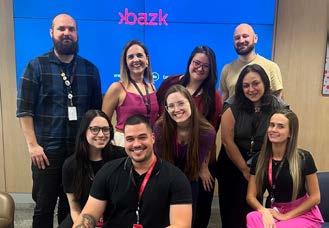


“What do you want to be when you grow up?” It’s one of the first questions we’re asked as children. Then, as adults, the question shifts to: “What’s your future plan?” The wording changes, but the meaning stays the same — how much of your value is tied to your work?
Bruna Verdi is in a transitional phase when we speak, having recently stepped down as Head of Legal at Entain. I wanted to talk to her about new beginnings — about what it’s like to look ahead without clinging to the question, “What do you want to be when you grow up?”
She worked for 15 years in Brazil’s renewable energy market, helping foreign companies enter the country’s regulated industry. For her, change has always been a constant.
Sometimes we focus so hard on becoming someone, on being somewhere, that we tie our worth to the temporary. “Some people associate their identity with a job, and that’s dangerous — I don’t want to do that,” she said.
Despite the poetic nature of life’s ever-changing course, fear and uncertainty are natural when bills need to be paid. Verdi smiles and takes a deep breath.
“What scares me most is uncertainty because I’m sure there’s something for me out there — but what will it be? It’s scary, but it’s also a form of self-confidence and faith in God that something good is coming. It’s always been like that for me, so why would it be different now?”
Hustling for your place in the workplace is the normal path, given that it is not easy to survive, and only the strongest — and the semantics behind this word are debatable — manage to do it; Darwin’s words, not mine.

In a world where women are usually put in a place of shadows in the workplace, struggling to grow higher without the support needed, SBC decided to create a program in order to help the industry to become a more equal place for both men and women, shining the light on equality. This is how the Women Empowerment (WE) initiative was created.
WE aims to connect, educate, and empower women, fostering a community of strong, inspired leaders ready to make an impact — including in magazine pieces, such as this one. Make sure to check out the work on our websites and social media.












iGaming Expert Editor Joe Streeter ponders the success of this season’s array of Irish-themed games

As the dust settles and the hangovers ease from March’s St Patrick’s Day celebrations, a sea of Irish slot titles flooded in from suppliers across the globe and Luck’s Wild Pub by Pragmatic Play emerged as the most popular of the month.
In the years since Barcrest (now Light & Wonder) launched the Rainbow Riches in 2016 it has become one of the most popular games of all-time. It has inspired a huge array of Irish-themed games, which look to tap into gamblers’ love of lucky symbols such as four-leaf clovers, leprechauns, pots of gold, and horseshoes.
Data from iGamingTracker revealed that six of the top 20 Irish-themed games this year were developed by Games Global’s studios, with 9 Pots of Gold its most successful title.
In second place was Playtech’s Leprechaun Luck, which underlined a strong period for Playtech as the firm’s Leprechaun Luck Cash Collect also came in seventh on the list of top Irish games.
As a result of the significant success enjoyed by Irish games, St Patrick’s Day has become a key event in the iGaming calendar.
Luck’s Wild Pub, which debuted in mid-February, has enjoyed the most global exposure, proving that players continue to resonate with Irish themes, particularly around St. Patrick’s Day.
Furthermore, the research also detailed that while there are some themes that only resonate with certain markets – the Irish theme transcends various regions.
“
“ Slot game themes evolve over time, with successful titles often giving rise to entire subgenres
However, it’s the UK that has the strongest connection to the games that are Irish-themed, according to the iGaming Tracker data. Among regulated jurisdictions, the UK accounted for 6.1 per cent of all Irish-themed games. Spain was next with 3.8 per cent, and then came Sweden, New Jersey, Italy and Brazil.
The range of Irish games is similar to the monumental growth
of fishing titles, where Fishin’ Frenzy, launched by Blueprinting Gaming in 2017 opened the door for a whole new era of titles that have set the trend for iGaming operators in the modern era.
Players’ engagement with the game led to a series of sequels, inspiring other studios to create their own fishing-themed slots. A notable example is Pragmatic Play’s Big Bass Bonanza series, which has significantly contributed to the growing preference for fishingthemed games among players.
This trend demonstrates how slot game themes evolve over time, with successful titles often giving rise to entire subgenres. You could also look at the huge number of Egyptian titles that followed IGT’s Cleopatra or the gem stones games that followed NetEnt’s Starburst.
Irish-themed slots will no doubt continue to hold a strong seasonal appeal, but the success of each new game will depend on innovative reinventions and fresh gameplay mechanics to keep players engaged.

Scan here for more from SlotBeats
With DraftKings and Rush Street Poker launching new regulated poker products and a plethora of new sweepstakes or social options, poker is exciting again. But will it drive legislative change?
Words by CONOR PORTER & STEVE HOARE
There is more excited chatter about online poker in the US than at any time since the 2010s. After launching its Electric Poker product in Michigan in August last year, DraftKings has gone on to launch it in Pennsylvania and New Jersey. Almost three years after acquiring Run It Once Poker from professional poker player Phil Galfond, Rush Street Interactive (RSI) officially launched its BetRivers Poker platform in Pennsylvania, with other states set to follow.
And the action is not limited to regulated operators. Former WPT executive and Penn National Head of Interactive Jon Kaplowitz returned to the fray as CEO and Co-founder of new social/sweepstakes poker site Clubs Poker, which launched in mid-2024. World Poker Tour followed suit with its own sweepstakes poker site, ClubWPT Gold, later in the year.
The buzz around poker was increased further when Caesars Entertainment confirmed it had finalised the $500m sale of the World Series of Poker (WSOP) brand to NSUS, the parent company of the world’s biggest poker platform GGPoker.
RSI Director of Poker Marketing Jesse Wilke says: “The US online poker market is at an inflection point. With a rapidly evolving regulatory environment and growing consumer appetite for digital, skill-based gaming, the time to invest is now.”
To that end, RSI has signed up Phil Hellmuth as a brand ambassador and is investing further in making sure that BetRivers Poker is an omnichannel product.
“Our integrated strategy — which in the Pennsylvania market links BetRivers Poker with live experiences at Rivers Casinos — underscores the momentum behind the market. It also presents good cross-selling opportunities,” says Wilkes.
“By combining cutting-edge technology with a memorable omnichannel experience, we’re wellpositioned to capture and drive long-term growth in this dynamic landscape. Poker also plays a key role in broadening our player base, serving as an entry point for customers who later engage with our casino and sportsbook offerings.”
We believe the future of US online poker is strong. With regulatory advancements and increasing consumer demand, online poker is positioned to grow as a key part of the online gaming market
NSUS has committed to making ongoing efforts to get online poker regulated in more states
As well as a key acquisition and retention tool, it is important that it is a “player-first experience”, says Wilkes, highlighting the input of Galfond and other former professional players in the platform’s development.
“This approach ensures that every feature, from our game variety to our rewards systems, including the Rakeback Revolution program, truly resonates with the poker community and bridges the gap between online and live play,” said Wilke.
Caesars’ sale of WSOP was not the end of its involvement in poker. While NSUS/ GGPoker will have exclusive access to the brand overseas, Caesars will continue operating its WSOP Online realmoney poker business in Nevada, New Jersey, Michigan, and Pennsylvania for the foreseeable future.
Caesars also retains the right to host the flagship WSOP live tournament series at its casinos in Las Vegas for the next two decades, its brick-and-mortar poker rooms will continue to have WSOP branding, and its destinations will have preferential rights to host live WSOP Circuit events. Acquirer NSUS does not operate any US online poker rooms.
NSUS Group Managing Director Paul Burke tells us: “We do not consider it a good time to invest in online poker in the US, as so few states are regulated at present, but NSUS has committed to making ongoing efforts to get online poker regulated in more states. Our hope is that over time, more members of the US poker community will be able to freely participate in regulated online poker and that the industry will grow as a result.”
The flurry of activity in the market has got some commentators suggesting
that poker could be an engine for stalled iGaming legislation.
Corridor Consulting CEO John Pappas, a government affairs expert and former executive director of the Poker Players Alliance, says he likes the idea of poker as the tip of a spear for broader iGaming expansion but sees a few obstacles.
“The existing industry that supports broader iCasino expansion is not going to be OK with just poker-only,” he says.
There is not enough money in it, for one. And not everyone has a poker product.
“The motivation for any state to expand gambling – especially online gambling –is tax revenue. It’s hard to believe that poker-only could provide a compelling tax narrative in a state to motivate lawmakers to take up the cause,” he says.
He also notes the complicated nature of state compacts, which are needed to build the liquidity that makes online poker a success. However, there has been some progress in that regard.
In October last year, Pennsylvania’s Governor Josh Shapiro asked the Pennsylvania Gaming Control Board (PGCB) to negotiate the Keystone State’s entry into the Multi-State Internet Gaming Agreement (MSIGA).
Established in 2014, the agreement means that poker operators with operations in Delaware, Michigan, Nevada, New Jersey, and West Virginia can pool liquidity, although West Virginia’s membership is only notional with no licensed operators live in the state. BetMGM and its PartyPoker operations, WSOP Online and PokerStars are the main beneficiaries of the agreement at present.
At the time of going to press, the Pennsylvania Gaming Control Board was preparing to join during the second quarter but its enrollment had yet to be confirmed. Lawmakers in Connecticut also recently filed a bill that would allow it to join the compact.
These seem like minor changes but the potential addition of Connecticut, Pennsylvania and West Virginia would allow poker operators access to a population of 42.2m.
Of course, this is not such an impediment for social or sweepstakes operators such as Clubs Poker, Zynga, VGW’s Global Poker or ClubWPT Gold. Clubs Poker CEO Jon Kaplowitz told Pokerfuse that it had access to 44 states (although that might have changed in recent months, see Hot Topic feature p.14). Kaplowitz describes Clubs Poker as social casino 2.0. While the vast majority of its players are free-to-play, it has the added aspect of sweepstakes currency.
The Clubs Poker CEO is adamant that there is a huge demand for online poker but laments the “dire number of options” for players. It is a gap that he hopes to fill – as do the likes of DraftKings, RSI et al.
“We believe the future of US online poker is strong,” says Wilke. “With regulatory advancements and increasing consumer demand, online poker is positioned to grow as a key part of the online gaming market.
“Platforms like BetRivers Poker — built on advanced technology, shaped by player feedback, and enhanced through omnichannel integration — are driving this expansion. As we grow into additional jurisdictions, we’re excited to continue evolving our poker product and further positioning poker as a driver of engagement across all of BetRivers’ gaming offerings.”
While Wilke’s buoyancy is shared by many, Burke at NSUS is more cautious:
“US online poker needs support from both state legislators and online operators, with the ultimate aim of being regulated in more states, just as we’ve seen happen with sports betting and other verticals.
“Without this support, it will lag behind other gaming options. Once additional regulated markets open up, US online poker will be in a great position.”




Wazdan Chief Commercial Officer ANDRZEJ HYLA looks at the software supplier’s journey across the Americas
How would you assess Wazdan’s growth and market position across North and South America?
Wazdan continues to expand its impressive global footprint with recent success driven by a strengthened presence across North and South America, a testament to our innovative gameplay tools that align with regional player preferences. All games comply with the varying local regulations across the North American regions we’re live in. This includes New Jersey, Michigan, West Virginia, Pennsylvania and Ontario.
Through our developed momentum, we have also increased the pool of landmark operators we partner with, whilst aggregators such as Light & Wonder have allowed us to reach a broader audience across the region.
Turning attention to South America, having already established ourselves in Colombia and Argentina with major brands such as Betsson and Betplay, entering Brazil and Peru was the next logical step, bringing our customisable approach to a new pool of players. Our expansion has seen us go live with over 50 certified games available to more than 40 operators across the two countries, including the likes of Brazino 777, Kaizen and LeoVegas.
How do strategic partnerships with operators in the Americas strengthen Wazdan’s market position?
A willingness to tailor our game offering and commercial strategies for varying demographics within the Americas has allowed us to work directly with industry giants,
including Light & Wonder and prominent names like DraftKings and Tipico, who deeply understand local markets. These close relationships have increased brand visibility across the landscape due to our confidence in delivering what players demand for an ideal gaming experience.
Which Latin American markets are Wazdan’s top priorities, and what makes them particularly promising?
Wazdan’s games have gained popularity across LatAm markets due to their innovative gameplay tools that align with player preferences, particularly in Brazil and Peru, where the regulatory landscape constantly evolves and provides new growth opportunities. Engaging features, such as Hold the Jackpot, encourage players to invest more time by triggering jackpot bonuses. As for Wild Rampage, the mechanic has become favourable with LatAm players who enjoy fast-paced environments, enthused by the thrill of risk-taking in search of big wins.
We have also cautiously incorporated local themes inspired by LatAm culture and carried out meticulous research and development, leading to particular themes being pushed and gaining substantial traction. Mighty Wild: Jaguar - inviting players into the depths of the jungle in search of lavish wins - has been a particular success, receiving multiple iGaming nominations and positive feedback for its innovative mechanics. With established success in Colombia and Argentina, we are confident our in-depth knowledge of the LatAm landscape will lead to us replicating this success across Brazil and Peru.

Which Wazdan titles have resonated most with players in the Americas, and what sets them apart?
Again, a clear focus on integrating cultural elements within gameplay alongside cutting-edge mechanics has helped titles stand out within a highly competitive Americas market. 20 Coins Grand Gold Edition established itself with its high payout opportunities and the perfect blend of classic and contemporary mechanics, including Hold the Jackpot. Mighty Wild Panther and Mighty Wild Jaguar titles resonate with their vibrant and immersive graphics and nods to cultural references and dynamic gameplay features. The same can also be said for Magic Spins, with its recent nomination at the North American EKG Slot Awards underlining its appeal across North and South America.
What is Burning Board Scratchcard, and what makes it unique?
We’re incredibly excited about this new product, which leads with a fresh take on popular themes from Wazdan’s top-performing titles, including 9 Coins and Mighty Wild: Panther. Players enjoy an easy-to-understand, scratch-cardlike experience where they ‘burn’ the board, similar to a traditional scratchcard, offering instant
excitement, further boosted by a special Buy Feature which allows players to purchase multiple scratchcards at a discounted price for a more flexible and rewarding experience. The innovation combines advanced software with straightforward yet captivating gameplay, making it the perfect product for the operator’s players to enjoy globally.
How does the new Game Manager Client enhance operational efficiency for casino operators?
Enhancing the user-friendly nature of our new Game Manager Client guarantees operational efficiency for casino operators. The asset preview gives partners quick access to all game-related files, making management and integration faster and simpler. Certificate preview ensures regulatory compliance by offering easy verification of game certifications and boosting credibility, whilst the clear game list makes selecting games for promotions or updates straightforward. As for the realtime client statistics overview, real-time client performance monitoring enables operators to respond quickly to varied needs or demands, empowering them to make data-driven decisions.
Our support section streamlines communication with our team,
accelerating issue resolution and minimising downtime. Features like the game roadmap preview help operators align their marketing strategies with upcoming releases, and brand view grouping simplifies managing multiple brands. Plus, our upcoming asset cart will further enhance asset management. With these features, partners will have everything they need to operate more efficiently and deliver an exceptional gaming experience.
What can the industry expect from Wazdan at SBC Americas, and which other key events are on your agenda?
As with any major industry summit, we look forward to showcasing our comprehensive offering, blending quality, prestige and innovation. Attendees will be able to discover Wazdan’s latest promotional tools and an exclusive preview of our upcoming games for the quarter. To add extra appeal, visiting Booth D650 will also allow visitors the chance to experience Wazdan’s Burning Board Scratchcard and be in with a chance to win an array of eye-catching Apple gadgets. Whether you are an existing partner or looking to explore new opportunities, join us and engage with a team eager to showcase how Wazdan can benefit you as an industry-leading provider.


Words by
With the threat of expulsion from the Nasdaq Stock Exchange still hanging over Codere Online, AVIV SHER could be forgiven for saying good riddance to 2024 but, on the contrary, the Chief Executive is confident that the operator can shrug off its temporary challenges and continue as a market leader in Mexico and Spain
Back in November, Nasdaq announced that Codere Online would be delisted from the Stock Market after failing to file its accounts.
The operator said its new accounting firm getting up to speed but things were made much worse when that new auditor Marcum unexpectedly resigned in late December.
CEO Aviv Sher flips between shrugging it off as a “temporary challenge that the company is working to resolve” and telling analysts that they are working day and night to resolve the issue. Both can be true, of course.
Sher explains: “In the hearing panel held in January, we received the maximum extension Nasdaq could grant us, giving us until mid-May to file our 2023 annual report. We are working closely with our [new] auditors to complete the audit ahead of the deadline and file our annual report, thereby regaining compliance with Nasdaq requirements and putting this issue behind us.”
Sher is not keen to expand on the issue. Despite the ongoing auditing troubles, Sher sees 2024 as “a positive year of consolidated growth” for Codere Online. Total revenue for the year was up 23 per cent to €211.6m, with Spain up 16 per cent to €87.7m and Mexico up an outstanding 30 per cent to €106.6m. Together the two countries account for 92 per cent of revenue.
“We issued four successive quarters of positive adjusted EBITDA [to total €6.4m], which was our main goal for the year. We also maintained double-digit revenue growth and further boosted our headcount as a company. We successfully navigated a very busy sports calendar with the UEFA Euros and Olympics and continued to improve our marketing investment throughout the year,” he recalls.
There were also challenges for the company, which faced flat results in Mexico in Q4, mainly due to a significant devaluation of the peso. On top of that, it experienced a lower sports betting margin on the back of customer friendly NFL results.
It seems that Argentina President Milei would veto any law to ban gambling advertising “



We remain committed to excelling in our core markets, rather than a mass-market entry across Latin America

Aviv Sher, CEO, Codere Online

“In constant currency terms, our revenue would have grown 14 per cent, plus an additional 10 per cent if we were to normalise sports betting margin. As such, the underlying trend is still very strong and we continue to see a great opportunity to grow in the Mexican market,” says Sher.
Almost any conversation with a Latin American gaming executive starts with the big opportunity offered by the new Brazilian regulation but Codere Online has decided it will wait and see, rather than rush and jump into a fierce competition in this early stage for the market.
“Our focus is on capitalising on our positive momentum in our core Mexican and Spanish markets. Brazil has been a focal point for much of the industry, and as we’ve seen,
there are already 68 operators that were live on the very first day the market opened up,” the company CEO assesses.
“If we feel like we can make a difference, be successful, and navigate a strong entry, then we may change our current outlook,” he adds.
In the same sense, Sher won’t lose any sleep over missing opportunities in Peru and – potentially – in Chile and says: “We remain committed to excelling in our core markets, as well as navigating expansion opportunities in countries where we are already present, like Argentina, rather than a mass-market entry across Latin America. We are mindful of our resources and have been selective about where we operate as we feel these jurisdictions are the best fit for us, and are constantly analysing the situation and our capabilities.”
Besides Mexico, Codere Online has a healthy operation in the City of Buenos Aires, in Argentina, and in Colombia. However, uncertainty around the regulatory framework in Colombia is another headache.
“The introduction of a 19 per cent value-added tax (VAT) on customer deposits via an emergency decree in Colombia, remains a challenge that requires close monitoring and constant adaptation,” says Sher.
He has warned that, due to the increased cost of betting for local users, they might migrate to the illegal sector, meaning the new tax has the potential to become a hazard for everyone involved in the regulated market.
As for Argentina, the main concern revolves around the potential ban of gaming advertising that was passed by the Chamber of Deputies late in November. At the time of writing, the Senate has yet to set a date to endorse or reject the Lower Chamber’s decision, but – even as the main sponsor of leading football club River Plate – Sher doesn’t seem overly concerned about it.
“We’ve seen similar regulatory shifts in Spain, so we understand the challenges and adaptations required. In Argentina, the push to ban gambling ads and sponsorships is part of a broader global trend toward stricter advertising controls,” he says.
If worst comes to worst, the company will assess the situation and “come to a solution that has the best outcome for all stakeholders,” but Sher is quietly confident it will come to nothing.
“In any event, it seems that President Milei would veto any law to ban gambling advertising should it be approved by the Senate, so we
do not expect it to come into effect anytime soon,” he says.
Regardless, the CEO sees this global trend as an opportunity to “push operators to innovate in customer engagement and retention,” and ensures Codere Online “remains committed to responsible gaming and working closely with regulators to find balanced solutions.”
“Our focus will be on compliance while ensuring a strong, sustainable presence through alternative marketing and engagement strategies,” he suggests.
In spite of all the inconveniences Codere Online has faced throughout the past year, Sher assures us that the business “can only focus on things that are within (its) control” and remains confident “that the business (they) have built over the last few years is on solid footing.”
With an increased “competition, partnerships, and innovation, especially in live betting and gamification,” within the industry, he sees a “strong demand for localised content, payment solutions, and responsible gaming measures” in Latin America.
Financially, the company forecasts it will improve its revenue by 6 per cent in 2025, reaching between 220 and 230 million euros.
“We plan to continue prioritising our key markets of Spain and Mexico, improving our offering to our customers and enhancing our technology to provide the best service possible,” Sher concludes. “We will also continue to look for innovative ways to capture and retain customers and have them engaged in both sports betting and casino, which has been a key driver behind our success in recent years.”

GAMOMAT Managing Director ROBERT KOCHER speaks to SBC Leaders about the company’s strategic expansion into the Brazilian and US markets with fresh, engaging content that appeals to the region’s diverse player preferences
With your first games nearing launch in Brazil and the US, what are the biggest challenges in entering these markets, and how are you approaching them?
Launching in Brazil and the US marks a huge moment for our business - a milestone we’re incredibly proud of. Entering these markets certainly has its challenges, as each has its own compliance, player preferences and approval processes. But for us, that’s all part of the excitement. We love having the chance to show how versatile we can be and how committed we are to super-serving local players. GAMOMAT has a history in quickly establishing a foothold in new markets as we demonstrated in 2021 with the Netherlands - the market remains a strong performer for the business.
Brazil’s long anticipated move to officially regulate on 1st January 2025 was a positive step. Our expansion is supported by long-term partner Bragg, which has helped us smoothly navigate the regulatory hurdles. Our games will be going live in the nottoo-distant future, so we’re doing everything to ensure we’re fully compliant. The aim is to give Brazilian players an experience that is both familiar and contemporary.
Looking north to the US, we appreciate that the market represents a different proposition. The US is passionate about entertainment-driven experiences, elements such as intense animations, frequent features, and a lot of excitement - even for smaller wins.
Our approach focuses on improving it further with mechanics like Hold ‘n’ Respin games, which have performed well in the US.
We’re also pushing our games to the next level by introducing bigger multipliers and more striking animations to meet American demand. The approach at GAMOMAT is all about the long term. It’s not just about launching games - it’s about nurturing relationships with players by really understanding what they want. We can’t wait for players in both markets to dive in and experience what we’ve been working on.
Land-based gaming has a rich US history, while online gaming is still evolving. How do you see the relationship between the two developing, and what opportunities does that create for you?
Our story started in the land-based world in 2008, which makes us a perfect match for the US market’s long-standing love for this vertical. This history gave us a real advantage when we moved online in 2014, giving us the knowledge to blend the best aspects of both formats. We view the relationship between land-based and online gaming as complementary rather than competitive. There’s a clear opportunity to use our land-based origins to improve our online offerings, particularly by creating games that appeal to both audiences. Players who seek that familiarity of the land-based world can find that same excitement online. Those wanting a more dynamic experience benefit from our work on enhanced graphics, animations, and interactive features.
“ The aim is to give Brazilian players an experience that is both familiar and contemporary
Strictly adhering to regulations is a cornerstone of our journey - whether aligning with Germany’s regulations from 2021 or meeting the nuanced requirements across US states, such as Connecticut’s special certification standards. The goal is always being compliant without jeopardising the quality of our content. Our challenge is to take these different requirements into account and implement them in our games.
Looking ahead, we’re totally committed to integrating the highengagement feel of land-based games into the online space. For us, it’s about maintaining what makes each format unique while ensuring players get the best of both worlds. We’re truly optimistic about the opportunities ahead and eager to see how this approach continues to develop.
Looking at the months ahead, what are the key industry trends shaping your roadmap, and how are they influencing your focus for the rest of 2025?
It’s an exciting time to be part of the company as we have a lot coming down the pipeline. Our roadmap revolves around expanding successful series, keeping our content fresh, and understanding what players really want. An integral element is the Flaming Link series, which is already producing eyecatching results. We’re introducing the mechanic to some of our biggest hits like Ramses Book and Crystal Ball to keep things interesting for both new and returning players.
Feng’s Fortune Flaming Link is a hotly anticipated release, and we can’t wait for the reaction. The original Feng’s Fortune hit the market in 2023, instantly

producing outstanding results and consistently ranking among our top-performing titles. Anyone who’s played it is transported to the heart of ancient China, with its stunning visuals, absorbing soundtrack, and innovative gameplay features –adding the Flaming Link feature takes it up another level. The first game to feature the Flaming Link mechanic was Ramses Book Flaming Link, which received great fanfare and delivered even better results.
We’ll continue to track what moves the needle in certain markets to support future decisions. For the US, Great Grizzly will soon launch with the kind of high-impact gameplay that American players love. Set in the expansive wilds of North America, it leads players on a stunning journey through a kingdom ruled by the majestic grizzly bear.
We won’t stop there either as we want to continue diversifying our portfolio. Leading the charge here are titles like Frooty Troupe Sun Splash, which have easy-to-grasp mechanics complemented by richer experiences. We’ll remain confident about earning further recognition and repeating the accolades from the 2024 CasinoBeats Game Developer Awards where we walked away with the coveted Best Game Development Company Central Europe award. Each company was judged purely on analytical data, ensuring an objective assessment without subjective influence.
Our plan for the remainder of 2025 is simple: expand on what works, and deliver high-quality, entertainmentdriven games that appeal to a wide audience. We’re encouraged about the months ahead and ready to see how our strategy unfolds.


Games need to be fresh and engaging to resonate with players across different markets. How do you balance innovation in game design with the need to adapt to different regulatory and player expectations?
We’re driven by giving players what they want - whether it’s a classic, stripped-back experience for traditional fans or featurerich games with striking graphics for those who want more.
The superb studio has also been experimenting with modern styles to appeal to a broader audience. Our Flaming Link series is the perfect example. By adding intermediate targets with smaller zones and multipliers, we’ve made the gameplay more dynamic and rewardingespecially for US players who like regular possibilities to win and plenty of action.
Flaming Link is off to a roaring start, showing almost three times the bet volume and active players compared to some of our other games. UK-based players have also shown a great interest, suggesting these mechanics work in multiple markets.
Ensuring our games can be enjoyed in international markets means we must stay ahead of the different regulatory requirements. Our plan is to methodically expand the Flaming Link series - balancing classic and complex game offerings while making sure we comply with local rules. Player reaction has been pivotal in shaping our roadmap, helping us decide where to focus next.
In the coming months, we’re committed to pushing creative boundaries while keeping our attention on what our diverse player base wants. We’re passionate about making games that are artistic and truly engaging.
A trio of leaders at Greentube – CFO/CGO
MICHAEL BAUER, US CEO BEN SUTHERLAND, and Sales and Key Account Manager WILSON FRANCISCO – discuss all things Americas as the developer chases panregional growth


was a year of growth for Greentube in the US after launching in Connecticut. How did you approach this, and what progress have you made in the state since going live?
Bauer: Our approach to Connecticut has been similar to that we’ve undertaken in all of the US states we’re live in. It was rooted in meticulous planning and a deep understanding of its unique regulatory landscape and player preferences. We prioritised building strong partnerships with established operators and ensuring our content was fully compliant and tailored to resonate with local audiences.
On the back of this preparation, we have seen positive initial traction, with our popular titles gaining significant player engagement, and our focus on building brand awareness is key in establishing a solid foundation for long-term growth. We’re actively monitoring performance metrics and will adjust our strategy accordingly to maximise our impact there.
The US online casino market is notoriously difficult to expand in, given the lack of new states. What opportunities do you see for the US going forward, and how do you focus on achieving growth in existing markets?
Bauer: I don’t expect huge movement in 2025. Still, I think several states will continue to have the conversation and take the possibility of regulation further down the road, albeit slowly.
While we will keep a keen eye on new developments across the country, our focus is otherwise on deepening our penetration by delivering high-quality, localised content that resonates with players.
Last year’s G2E provided the platform for us to unveil new slot games tailored for the US market, alongside our innovative Tapper games, Piñata Blast and Hit Me Baby! Elsewhere, we focus on new mechanics in the slot segment while enhancing our table game offerings with a new electronic roulette product. Moreover, we are engaging in discussions with our customers to understand their perspectives on US market development, utilising the insights gained to create concepts and provide effective solutions collaboratively.
What can we expect from your local US subsidiary in 2025? Can you give us a little sneak peek into their games pipeline?
Sutherland: This year, Greentube US will deliver a diverse game lineup. You’ve already seen the first of our All-Scatter games with Dessert Kingdom, and more titles in that series are on the way. Our Tapper collection is also growing, with Lucky Sword and Lamp of Wonders launched in the first quarter of this year, and we have more on the way. Looking ahead, we have an even greater variety in store, including several 3-pot titles, a couple of eye-catching Ways-style games, and a mix of classic favourites and modernised updates to round out the roadmap.
Brazil is not our only target – we’re also live in Peru and are ensuring our content is appealing to specific player preferences on a micro level

“
Moving south to Latin America, what are Greentube’s key focus areas in this region?
Bauer: Expanding our licensing efforts in Brazil is a high priority, as it represents a significant gaming market, and our goal is to become a leading supplier there. Since regulation in Brazil has come into effect, we have adjusted our strategy to allocate more resources to it. Now, Brazil is incorporated into our global licensing process for all upcoming games, and we are fully committed to establishing a local sales team and enhancing our marketing efforts, particularly with streamers.
But Brazil is not our only target – we’re also live in Peru and are ensuring our content is appealing to specific player preferences on a micro level.
How do you tailor your output for Latin America compared to North America or Europe?
Bauer: We have a certain number of games that prove popular in markets that share similar characteristics. These will be rolled out where appropriate, but our localisation efforts are of vital importance. We’re ensuring we examine player trends and preferences accurately, talking to operators and those with established experience in the market to create entertainment experiences that we know players in the region demand. Additionally, we are learning from the performance of our games in the social casino market, which we have been supplying for quite some time.
Greentube recently spoke to SBC Leaders about the Brazilian market. Since then, you have signed new partnerships. Tell us about your Brazil journey and how you are finding that market.
Francisco: We’ve made significant strides in establishing a strong presence in the market thanks to new strategic partnerships with major operators. The market is proving to be dynamic and receptive to our content, with players showing a strong affinity for our popular titles.
Early performance has been encouraging, and we’re committed to investing in Brazil in the long term. Our focus is on deepening our local presence and further
expanding our market share by delivering high-quality, locally relevant content and building strong, long-term relationships with key stakeholders. We’re currently in negotiations with a number of important local partners and we hope to be able to announce more very soon.
One of Greentube’s core focuses in Latin America is the Capecod solution. What about Capecod makes it stand out, and why is it perfect for Latin America?
Bauer: Like in other markets Capecod operates in, its distinction lies mainly in its diverse content, especially slots and crash games. What sets it apart most from other providers is its Cupid Platform - a unique suite of marketing tools that currently has no competition in the industry and is a key player acquisition tool. In addition, Capecod acts as a content aggregator for the group, distributing third-party content as well.
Capecod has become one of the leading distributors of Greentube content and enjoys a strong reputation among Brazilian players. As a result, an integration with Capecod allows access to over 200 games, with more launching weekly. Combined with the player engagement tools, it is a compelling proposition.
Finally, what plans does Greentube have in the Americas throughout the rest of 2025? What can readers expect to see?
Bauer: Greentube’s primary focus for the remainder of this year is launching in Pennsylvania. Successfully entering this jurisdiction will pave the way for exploring future US and broader North American opportunities, including Alberta.
Expansion in Brazil will involve increasing the game portfolio and ramping up marketing efforts. Capecod’s wider rollout, including Brazil, is key to the strategy.
You can expect to see a steady stream of new and innovative game releases tailored to the specific preferences of players in each market. We will also enhance our technology and platform capabilities to provide a seamless and engaging player experience. We are committed to solidifying our position as a leading provider of online gaming content in the Americas.
Integrate in as little as 5 days

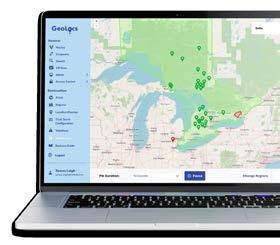
No companion apps or additional downloads
Live in Canada, North America and Brazil 13+ years of trust Scan to










































The next five years will see a complete reconfiguration of the gambling industry’s public companies, writes SBC Editor at Large Ted Menmuir
Now, sitting at the top with a valuation of +$50bn, Flutter sets the benchmark against which all gambling PLCs will be measured, as investors seek a scale-efficient, proprietary tech-led, multimarket operator to invest in.
As such, too many heritage PLCs now appear simply analogue when compared to the top contender. One by one, they are losing market share to online offerings, and their responses have been muted — especially when considering their outstanding liabilities.
As we close a turbulent decade, should we expect investors to continue valuing antiquated metrics like footfall, games per square metre, weather impact, or inventory turnover? Capital investors will keep backing more dynamic enterprises, targeting a place among the industry’s most prized operators.
You can call it a changing of the guard, an evolution, or a reordering — but it should be seen as a natural progression.







Leading Chilean lawyer Carlos Baeza believes Chile won’t be left behind by the wave of gaming regulation sweeping through Latin America
Words
by
LUCÍA GANDO
The legislative limbo in which Chile’s gaming and betting industry finds itself has become even more evident with regulatory advancements in Latin American peers such as Brazil, Argentina, and Peru. Today, online gaming and sports betting operate on the fringes of legality. There is no regulatory framework for the industry. Those that operate in Chile do it due to the absence of a specific prohibition. It is the very definition of a grey market.
Of course, this is a problem for most stakeholders in the industry. The state loses potential tax revenue from gaming; players are exposed to
global platforms that may not follow advertising or compliance guidelines to protect them; self-regulated operators with experience in other markets are left vulnerable to unfair competition, and the industry as a whole faces new challenges that further damage its already questioned reputation.
While there is still hope that 2025 will bring a legislative update in Chile, there is a political sluggishness that will concern some, including operators represented by Carlos Baeza, founder of Carlos Baeza & Cia Abogados, the local law firm representing industry leaders such as Betano, Betsson, Coolbet, Latamwin, BetWarrior, and 1xBet.
Amidst this purgatory-like state, we spoke with Baeza and asked the inevitable question: Will Chile remain behind, or will it take the leap to align with the region?
At the moment, the Chilean market remains divided between pro- and antiregulation perspectives. Those in favour argue that gaming is already a wellestablished activity in society, as it is in the rest of Latin America. They believe the best approach would be to develop a specific regulatory framework to determine the industry’s operating conditions, benefiting companies, the state, and, most importantly, players.
On the other hand, physical casino and lottery operators express concerns about the consequences of the online boom, such as increased competition and the disadvantages of their licences. These opposition groups have been the most vocal against the development of online gaming and sports betting in the country.
At the moment, the national regulatory body, the Superintendence of Casinos and Gaming (SCJ), has no authority over online gaming, according to Baeza.
“The proposed law includes a legal modification that grants the SCJ a power it does not currently have: the ability to oversee online gaming,” he explains.
The bill to regulate “the development of online betting platforms” was introduced in March 2022, so its progress has not been swift. In 2023, the Chilean Chamber of Deputies overwhelmingly approved the bill but it later stalled in the Senate, awaiting an imminent debate.
The law would authorise the operation of online gambling and sports betting under the licences and supervision of the SCJ and the Internal Revenue Service. Additionally, responsible gaming measures would be implemented, and criminal penalties would be established for illegal gambling.
Another widely debated issue across Latin America is advertising, which, in principle, will be prohibited on any channel for operators without authorisation in Chile.
“This project is led by the executive branch through the Ministry of Finance, with whom we have maintained a very fluid dialogue throughout the legislative process. We hope it advances in Congress as soon as possible,” says Baeza.
“ This rule, which is currently included in the draft being discussed in Chilean Congress, contradicts constitutional norms and must be reviewed and corrected
Baeza points out that the online gaming industry has established itself as a key player globally, with a significant presence in major sporting events, increased media visibility, more sponsorships, and a growing user base. “Chile is no exception,” he states, “so we hope the regulatory process being handled by Congress moves forward.”
Baeza says recent examples from Peru and Brazil show that Latin America is positioning itself as a key player in the global gaming industry. “In this context, Chile should follow their example, especially regarding tax burdens.”
For now, however, the country seems to be falling behind regional trends, which directly impacts its economy and the industry’s transparency.
That said, Baeza clarifies that betting houses “operate normally every day, and their user base continues to grow.” He adds: “In Chile, online gaming is an unregulated activity, so it is necessary to establish a regulatory framework. The perception of alleged opposition arises from a misinterpretation by some authorities, who have stated that online gaming is prohibited in the country, which is not true.”
“This mistaken stance has been exploited and amplified by physical casinos and by Polla Chilena de Beneficencia, the state lottery company, to reinforce the idea that online gaming in Chile is illegal.”
This argument gained traction in 2023 when the Supreme Court of Chile declared 23 online betting sites illegal, ordering their access to be blocked in the country and banning sponsorships in national sports. This specifically affected the National Professional Football Association (ANFP), which had to annul previously established agreements and has since become an advocate for regulation and betting sponsorships.
Baeza sees these limitations as a major setback, stating that “there are no specific advertising restrictions beyond general regulations applicable to other industries.”
For example, television regulations prohibit gambling advertisements during child-protection hours. Outside of that timeframe, there are no special restrictions on marketing and sponsorships for online betting platforms.
As a result, international operators like Betano remain among the top-ranking platforms with the highest number of users, followed by local brands such as Coolbet and Jugabet, which currently sponsors major football clubs Colo-Colo and Universidad de Chile.
Baeza emphasised that his firm has demanded a review of two key aspects of the proposed regulation. Firstly, the removal of retroactive penalties and secondly, the high tax burden.
The regulation includes a provision that punishes all operators who participated in the market before the law comes into effect, forcing them to pay retroactive taxes.
“This rule, which is currently included in the draft being discussed in Chilean Congress, contradicts constitutional norms and must be reviewed and corrected,” stresses Baeza.
The bill proposes a 37.6 per cent tax rate, in addition to a 27 per cent corporate tax on profits.
“International experience shows that tax burdens are inversely proportional to channelling rates. In other words, the higher the tax burden, the lower the channelling rate, which results in fewer protected users and lower fiscal revenue. Correcting these aspects of the bill is crucial to ensuring a successful regulation,” he concludes.











SCAN HERE for more info on

Betsson Group Chief Technology Officer Fredrik Ogren, Betfred’s Chief Information Officer Andrew Daniels and Cristian Barbosa, the founder of InsightPlay.ai, discuss the latest developments in AI
by CHRISTIAN LEE
ntil now, the most obvious manifestation of AI in the gambling industry has been chatbots. The first point of customer service throughout the industry, and beyond, is almost exclusively communication with an AIpowered bot that aims to solve a user query - with varying degrees of success.
However, behind the scenes, Betsson Group’s Chief Technology Officer Fredrik Ogren tells us that AI is used for much more and is at the heart of day-today operations and driving operational efficiency.
There is such a focus on the use of AI within Betsson that the group has built its own AI centre of excellence.
“We’ve been working with AI quite a lot in the back office and customer service side since 2018. But in late 2023, we said that we can’t just do a little bit of AI integration and translate emails, that’s not the power of it,” he explains. “So we put together a heavy investment plan and asked what type of AI do we want to use for the future, and how will AI empower our products and organisation? To do that, we also set up a new AI strategy and AI governance track.”
He adds that the firm has a “top-down and bottomup” approach, meaning that AI is used to solve a particular business problem, rather than simply “applying AI to anything”.
For example, AI has been crucial in allowing Betsson to offer up to 1.4 million live betting markets that run through its system every year.
“It’s fully AI-powered,” says Ogren. “The only way that we could give this to our customers is by applying AI. No one could manually do this work.”
It appears to be working for the Stockholm-based group, as it posted its “best year in business” last year, reporting group revenue of over €1bn in 2024, underscored by product investments in online casino and sportsbook.
Efficiency is also the word of the day for Andrew Daniels, Chief Information Officer for Betfred, who details the “operational assistance” AI is providing the UK-based operator.
He says: “We’re using it throughout the software development lifecycle. So whether that’s taking a set of requirements from the business and using AI to help translate that into what developers understand or developers using code assistance to write code quicker and more efficiently.
“AI is helping us to test things faster and ultimately deploy things faster.”
The most common forms of AI are trained using vast quantities of data and, as such, the technology is particularly adept at spotting trends and outliers, a characteristic which is crucial when trying to identify and intervene in problematic player behaviour.
Ogren says: “When you look at spending patterns, how often they log in, what they do, and if their behaviour deviates from previous months of engagement, that is where I believe AI can help us and be better.” It can predict things faster and it can be more accurate. In the future, it might even have an automatic way of stopping or limiting play.”
However, both Ogren and Daniels are quick to point out that AI is yet to replace the human touch when it comes to player intervention, as Ogren explains that Betsson’s chatbot automatically routes calls to a service agent when queries pertain to responsible gambling.
Daniels adds: “We’re building models to help identify customers and seeing how well it does versus what we do manually. But, of course, it’s not something I believe as a business that we’re ready to put all of our eggs in the AI basket.
“Whilst – from a looking at data and signs of harm perspective – the theory is that AI and machine learning can do it much better than humans and find more data points, there is a leap of faith in that.
“How do you do that in a way that one, the regulator is going to be happy with, and two, leads to better protection of your customers?”
Bill Gates, the founder of Microsoft, recently shocked the audience of the Jimmy Fallon-hosted The Tonight Show when he told them that we won’t need humans “for most things” and predicted that AI will be used to treat the sick and teach future generations.
Rather than simply learning from vast reams of data, AI agents are software entities that can be assigned tasks, examine their environments, take actions as prescribed by their roles and even adjust based on their experiences.
Cristian Barbosa, Founder of InsightPlay.ai, says: “Something that companies in the space are getting more used to is [AI] going from just analysis into actual actions. Whether that’s marketing or customer service.”
This can be especially effective, Barbosa continues, for operators seeking to enter new jurisdictions.
“One of the main pain points for larger operators is that you’re open in a new jurisdiction [and you need] to hire customer service representatives that speak the language and are trained,” says Barbosa. “Now you can use AI for it. So your players will start speaking with an AI in any local language that you can imagine. That is one of the most disruptive uses of AI agents that we’ve seen.”
These agents have a knowledge base that you can train with the terms and conditions of the companies, the local regulations, the consumer protection statements and statutes of each country.

This might also spell the end of the aforementioned chatbots, which have been met with such dissatisfaction from some players due to their lack of reasoning.
While the interest in AI across the industry continues to grow, Daniels warns that its potential must be kept in perspective.
He says: “There’s no doubt a lot of hype and every supplier we use within Betfred, from a technology perspective, has got an AI module of some description.
“I think that the hype cycle is now dying down and people are thinking [about] what the real world use cases are, because none of this is cheap. In some cases, it’s cheaper to have people
“ AI can predict things faster and it can be more accurate with analysing spending patterns. In the future, it might even have an automatic way of stopping or limiting play
doing manual tasks than it is to have your own proprietary AI doing things.”
Daniels likens the hype around AI to that of mobile betting technology during the early rise in popularity of smartphones, however, he believes that the industry has learned from the mistakes, and vast sums of money wasted, during the mobile betting boom.
Ogren predicts that it will start to become clear which companies are and which companies are not effectively using AI technology: “You will see two different tracks in how organisations advance in the next couple of years. The ones taking advantage of it and powering organisations with it, they will most probably steam ahead and the people not taking advantage of it, they will fall behind.”


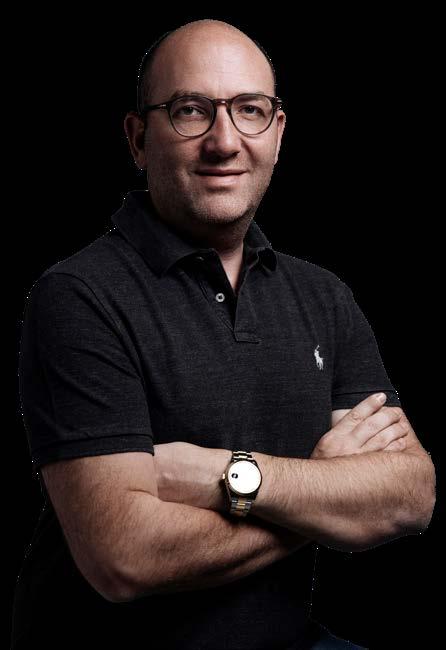
Soft2Bet Chief Product Officer Yoel Zuckerberg explains how it plans to compete with the giants of US sports betting with its new gamified sportsbook
The sportsbook space is shifting fast, and Soft2Bet is ahead of the curve. Our integrated solution takes betting beyond the basics by weaving in gamification through the MEGA platform (Motivational Engineering Gaming Application). Players aren’t just placing bets; they’re earning loyalty points, unlocking rewards, and engaging with interactive features that keep them coming back.
As one of the first to bring gamification into the sportsbook world, Soft2Bet delivers an experience that stands out and keeps players involved. Also, a few weeks ago, Soft2Bet announced plans to release iGaming content in the US during summer 2025. This milestone reflects our commitment to innovation and enhancing the player experience to bring our cutting-edge solutions to this dynamic market.
As sports betting continues to gain momentum across North America, the market is projected to reach a size of $13bn by 2025, driven by wider legalization and increased consumer engagement.
Soft2Bet recognizes the potential of this growth and leverages its MEGA platform to appeal not only to casino enthusiasts but also to a growing audience of sports bettors.
The MEGA gamification approach uniquely positions operators to tap into this expanding market, delivering an integrated solution tailored specifically
to the demand for innovative, interactive betting experiences.
MEGA
With MEGA (Motivational Engineering Gaming Application), our sportsbook transforms passive betting into something far more engaging. Gamification engines like Collectibles, where players complete coin sets, and Cities, where they build sports grounds and unlock new locations, add a layer of fun and progression. For operators, integrating these features into your brand isn’t just about entertainment; it’s a clear path to driving player engagement and business growth.
Results in numbers:
+65% Increase in NGR
+45% Increase in ARPU
+300% Growth in screen time
+64% New deposits
Players stay engaged, play more, and enjoy exclusive incentives as they bet. That’s how Soft2Bet’s Sportsbook Integration works.
BEYOND JUST A SPORTSBOOK
At Soft2Bet, we’re not just another sportsbook integrated solutions provider; we’re your partner in creating an exceptional betting experience. Our goal is to seamlessly integrate with your iGaming brand, helping you expand your player audience with our advanced betting solutions.
Gamification engines like Collectibles add a layer of fun and progression
“


“ Soft2Bet recognizes the potential of the growth of the US market and leverages its MEGA platform to appeal not only to casino enthusiasts but also to a growing audience of sports bettors
Today, Soft2Bet collaborates with top-tier data providers, which means your players will have access to both popular global sports and local events. With official data feeds, we elevate the quality of the betting experience, ensuring that your users are always in the know.
Our coverage includes major international leagues and local events, all enhanced by live streaming directly in our betting widget. We understand that every market is unique, which is why our flexible frontend adapts to local regulations, currencies, and user preferences, guaranteeing compliance and a smooth experience.
Promotional tools are built right in, allowing you to showcase special offers at just the right moments. Whether it’s highlighting big tournaments or local events, our promotional carousel keeps the excitement alive and boosts player activity.
Setting up bonuses is a breeze with our Bonus Engine. Just configure the trigger event and reward, and watch as your users receive their bonuses, cashbacks, or free bets in no time.
From flexible betting options to real-time match tracking, we provide everything you need for a top-tier sportsbook experience. With in-widget live streaming, your players can watch and bet simultaneously, making their experience even more engaging.
Managing a sportsbook can feel overwhelming at times. That’s why, at Soft2Bet, we’re committed to being by your side, offering the support you need to navigate these challenges. Our comprehensive back-office system is designed with partners’ operational efficiency in mind.
We provide 24/7 assistance in over 20 languages, ensuring that you’re never alone in this journey. With access to 70 payment methods and specialized analytics dashboards that give you real-time insights, you’ll have the tools to make informed decisions. Plus, we offer customizable marketing campaigns and the ability to set distinct user roles, making it easier for you to manage your operations smoothly and effectively. Together, let’s make your sportsbook a success.



www.approvely.com





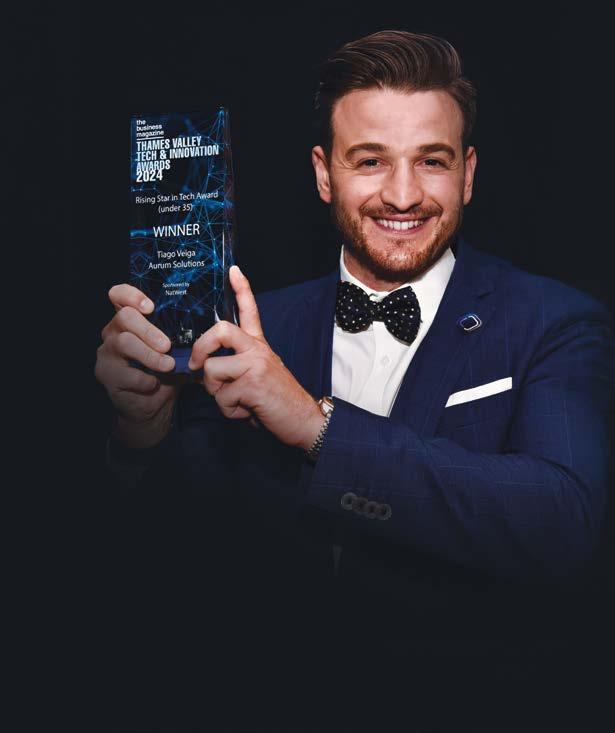
As politicians across the world turn their attention to the regulation of both gaming and fintech, betting stakeholders need to remain as vigilant as ever, writes SBC News Editor Ted Orme-Claye

It may not always be the case, but for the most part America is a trend-setting nation. In everything from fashion to finance, the world’s largest economy often sets the tone across many sectors and topics.
In the field of finance, the US is taking rapid steps forward with crypto adoption under the second tenure of Donald Trump. The outspoken president wants to see a strategic reserve or stockpile of crypto, and is a big fan of stablecoins.
Questions remain as to whether his hands-off approach to regulation will provide an assist to money laundering - but regardless, changing times in America may spell changing times in Europe, and the gaming sector will have to pay attention.
On other fronts though, the US lags behind its European, Asian and South American counterparts. And while Trump is very vocal about crypto, he has commented much less about things like Open
Banking, where countries like the UK are taking a lead.
Much like crypto, Open Banking is a technology being touted by some as a potential game changer for the gaming sector. Many firms – including William Hill, Betfred, Flutter, Entain and others – are already making use of the tech to enable quicker, more seamless payments and to broaden their payments reach.
Other stakeholders, like the UK Gambling Commission, see Open Banking as a potential solution to the gambling sector’s affordability question. On the other hand, some stakeholders, such as those at the SBC Summit Lisbon, have questioned this.
Regardless of its use cases, betting firms should pay close attention to the development of the UK’s Open Banking framework, which the Labour government is keen to push forward. The EU, Canada and the US could well follow suit.
Turning back to the US, while Trump is very vocal around crypto he has barely said a word about Open Banking, the regulatory future of the tech is unclear, particularly as financial authorities get distracted by the cost-cutting efforts of Elon Musk’s Department of Government Efficiency, which has turned its attention to some of these agencies.
The task for fintech will be selling Open Banking to Trump - as we all know, he loves a good deal. Perhaps pitching it as a potential multiplier to his crypto policies could be beneficial. For gaming stakeholders this could unlock the possibilities of both, but only time will tell.
Lastly, we can’t talk about payments without mentioning Latin America. Brazil’s Pix is, as I’ve stated in many other columns, one of the biggest success stories in modern fintech, having emerged as the country’s most popular payment method in just a few years.
Latin America’s enthusiasm for alternative payment methods and crypto can be explained by the historic underbanking and lack of trust in government seen across the region. This is not quite the same in Europe and America, particularly the former where debit cards remain firmly entrenched.

Scan here for more from Payment Expert
Will the election of President Trump to the White House lead to a boom in crypto-betting Stateside and will Europe follow Trump’s lead or carve out its own path?

So in this changing regulatory context, how soon could we see regulated crypto betting in the US? And could changes in the world’s largest economy prompt change elsewhere?
“Most of the changes made in the US will be reflected in Europe,” predicts Christoffer Andersson, Chief Operating Officer at 500casino, a crypto-focused gaming firm.
Looking at the US, a combination of a vocally pro-crypto administration in the White House, a general trend towards digitisation in finance, which has been happening across the western world, and a growing gaming sector, could make one think that crypto betting is also an inevitability.

“
If you have legal gaming and we accept that crypto is just a payment system, it is an inevitability


I believe that when you try to regulate crypto you are suffocating the entire purpose of crypto
“

Christoffer Andersson
“Without question,” says Matt O’Neill, Co-Founder and Partner at 5OH Consulting LLC, a consultancy firm which works with government contractors and federal law enforcement, when asked this same question.
“The US is creating a digital asset currency reserve… this administration top-to-bottom is very pro-digital assets,” he continues. “If you have legal gaming and we accept that crypto is just a payment system, it is an inevitability because it doesn’t take long to move money from digital assets into fiat currency, so you’re basically just eliminating one hop.”
It is important to note – and this will likely be stating the obvious to most American readers and perhaps a lot of

Crypto betting is widely considered an inevitability in the US then, it seems, but over in the EU, developments do not entirely mirror the American experience. For one thing, Europe is far more keen on regulation while the Trump administration has a more hands-off approach.
It is a widely held view that the Markets in Crypto Assets Regulation (MiCA) have had a positive impact on the European stablecoin market. This legislation indicates that the EU wants to keep a close eye on things. For some this might defeat the whole point of crypto –and by extension betting via crypto.
“I believe that when you try to regulate crypto you are suffocating the entire purpose of crypto,” 500Casino’s Andersson remarks.
“It’s a self-custodial kind of thing. It’s a currency that is more or less replacing cash in one way - you can keep it under your mattress in your wallet, in any way. Trying to regulate things doesn’t really go well with crypto, but obviously you still need to have some oversight.”
On the topic of regulation, it is nigh impossible to have a conversation about crypto, especially regarding how it relates to gaming, without discussing the threat of financial crime and money laundering.
This is an issue which has caught the attention of regulators and law enforcement across the world. It is even noteworthy in the US that much of the crypto held by the federal government was seized during law enforcement investigations.
Meanwhile, the United Nations has previously cited crypto and gaming as being two weak points for AML in Southeast Asia. Similar concerns around crypto, gaming and money laundering have been voiced by European authorities in jurisdictions such as the Isle of Man and Malta.
The amount of financial crime involving crypto has “exploded”, says O’Neill, who cites the ability to move money across borders and across different chains as making the space “very fertile ground for money laundering”. Scams are also common, with crypto scams now being some of the most widely occurring financial crimes globally.
“In the US, we’re really struggling with AML in general and so – without sounding too
pessimistic – no one has figured it out too well just yet,” he adds.
“I think there will be some growing pains and challenges, for the reasons that you can have global digital asset providers that don’t have to provide KYC, you have nested exchanges, and non-centralised access on cold storage wallets. It can be very complicated.”
While operators such as 500casino, who are directly involved in the confluence of crypto and betting, are adamant about the positives of crypto they recognise that regulatory hurdles will always be there. However, this is not necessarily a huge problem for their operations.
So when it comes down to it, where do we stand when it comes to crypto adoption in betting in both Europe and the US? And will the bigger mainstream players get involved in this still niche but evolving market?
In Andersson’s view, speaking from experience as a C-level figure at a crypto-focused business, the traditional fiat companies are unlikely to get involved in this sector due to the fact that they pre-exist it.
This means that fiat-focused firms’ UX/UI is geared more towards the mass market, while crypto-focused betting firms are geared more towards the “tech savvy” customer. Also, while Brazilian betting stakeholders may anticipate the inevitability of crypto-gaming, Europe has completely different market conditions and history that make it far less likely.
“There is a massive difference between European and Brazilian markets,” Andersson summarises. “It’s very rare in Latin American countries for people to have a debit card. For them going from cash to crypto is more of a natural transition than going from cash to credit to crypto like in Europe.”
He concludes: “From my perspective I have always seen crypto as something very positive - that gives freedom to individuals. But from the regulation perspective it will always be a black sheep.
“It’s so much harder to regulate or keep an eye on, so we become more or less a Robin Hood of currencies, where crypto gives more power to the people rather than being dependent on banks or other institutions.”


















No new states in the 2025 legislative season was bad news for struggling affiliates, which are looking to sweepstakes and prediction markets for new sources of revenue, writes, Affiliate Leaders Editor Charlie Horner

t’s something that listed affiliate CEOs lamented in their recent earnings calls, with Catena Media CEO, Manuel Stan, noting “competitors are focusing on the same markets as we are. The lack of new launches means less distraction, if you will. So everybody is trying to focus on their existing footprint and trying to focus on that.”
Stan’s comments came as Catena revealed that new depositing customers were down 19 per cent year-on-year in 2024, which the CEO attributed in part to the lack of new states launching.
But there are growth opportunities available. With just 16 per cent of the US population having access to regulate online casino sites, there is certainly room for growth.
Better Collective CEO Jesper Søgaard told investors that
online casino and esports in particular offer the affiliate firm opportunities going forward. The firm, which also posted tough 2024 financial results, sees both esports and online casino gaming as avenues for it to improve.
One of the biggest talking topics in the US in 2025, however, has been the rise of sweepstakes casinos and prediction markets. While two different product segments, they both have regulatory question marks but affiliate CEOs told investors that they are certainly keeping an eye on these verticals.
Catena’s Stan said that talking with sweepstakes casinos could put it in good stead for when more states legalise online casino in the future. He added: “Sweeps represent that gateway for us to put ourselves in the best possible position for when that happens.”
Meanwhile, Gambling.com Group CEO and Chairman, Charles Gillespie, was particularly bullish on prediction markets.
He said: “This is an even newer kind of segment and it’s super exciting,” Gillespie said. “I mean, this is a clear strong positive for us, I think, for multiple reasons.
“It’s basically new competition for state gaming regulators. To the extent that the regulation gets clarified in a way that this
can grow quickly, I think it certainly will.”
However, Gillespie acknowledged the challenges that the industry faces when it comes to sweepstake casinos, adding: “It’s growing, but we tend to focus on regulated markets and doing everything by the book. So we look forward to more clarity on how those products are regarded.”
With sweepstakes operators coming under pressure in a number of states, the regulatory outlook is unclear and affiliates might struggle to make long-term profits from this new product.
Yet, the comments are indicative of a tired US market. Affiliates are having to get creative to make the most out of the US and after some of the financial results from 2024, the pressure for improvement is vast.

Scan here for more from Affiliate Leaders


Betting Ladies Founder VAL MARTINEZ on stigma, gender neutrality, pink promotions, and how women are more analytical than men when it comes to sports betting
Interview by STEVE HOARE
Betting Ladies is an affiliate, first and foremost, but it feels like more than that. It feels like you’re creating something of a movement.
Yes. I like the definition of a movement because we still are the only sports betting community for women and affiliate marketing sites are very transactional. You click, you go through, that’s it. What we’re trying to create–what we have created–is a community of women bettors. We don’t have only sports betting women but we have sweepstake casino players because all of a sudden they started finding us in Google by word of mouth and what we attract is like-minded women who like to place a bet of any kind.
I’ve seen you on stages around the various conferences and you’re doing surveys and so on. I mean it’s part of building a brand of course, but it’s also part of building a community, right?
Yes, absolutely. Because we need to talk about things. I always say that we need to redefine the new normal and the new normal is that women bet as much as men. You’re English and that is not as weird as it is here. Because here in the US it’s a very new concept compared to Europe, where you don’t even think about it. You go and see Arsenal and you place a little wager with your friends just for fun. I used to do it with my girlfriends when I was in London–I lived in London for 15 years–and it wasn’t weird. We just do it. We wouldn’t even talk about it.
But here is a very new concept. The industry is very young. Sports betting has been legalised in some states in 2018, which coincided with the date I moved to the US, and they’re still learning the market. It is enormous and still has a lot of potential and opportunities including the female demographic.
Of course, sports betting is new outside of a small handful of states–Vegas and so on. But you’ve had casinos in many more states and if you go to most casinos, you’ll see women lined up in front of the slots and lotteries are nothing new, of course.
So, the culture around gambling is not new, I guess.
Yes. There is this big thing - like the illegal offshore sportsbooks have been there forever. And don’t get me wrong - I see people placing wagers even in California and they know they can cross the state line and they place a bet in Nevada and so on. So it’s not that betting is new - the legalisation is new.
The fact that we can talk about it to the mainstream population, that we can do advertising, that we can reach out–in my case to women–that’s a new concept and there is still as a little bit of a stigma around gambling because when you think about gambling you don’t think about entertainment you think about the problematic gamblers but what really sports betting or casino is saying is it’s just another form of entertainment. We are in the entertainment industry. It’s just a different connotation.
You brought up the stigma there. And you have conducted a betting survey, which found that 51% of women bettors admit to sometimes feeling guilty about betting, while only 15% of women are comfortable discussing their betting habits with their significant other. That’s not good from a responsible gambling perspective. How do we address that?
We talk about it. We create communitieswhere there are no stupid questions, where women can reach out directly to each other without judgement. They can share the wins, they can share the losses.
We do a combination of serious training with courses and videos that explain the odds or we talk about the specific bet per week and also we do silly things like ‘quit your job on Monday parlay’ when we take $5 and we do an eight-leg parlay that can give you $40,000. And we do a combination of both because nobody wants to be talked at. You need to be a little bit tongue-in-cheek when you approach the subject and make it okay to lose some money - because nobody won the eight-leg $5 parlay yet but they’re fun.

But do you think that stigma is more prevalent in women than men - that feeling of guilt?
This is a very good question because there are a lot of things that women are not supposed to do–to be athletic, for example–and that we still do. The US is still a little bit conservative when it comes to women, probably much more than Europe I would say. And I think wagering falls into that category too. But it’s changing. I see very successful women’s sports vectors that are inside the community. They understand the game very, very well and this kind of gives you an advantage when you wager.
I have in mind one specific person inside the community who told me that she spends six hours looking at odds before she places a bet, which is really impressive.
They are still responsible. But if you look at the overall performance of women in the gambling space our ROI–return on investment–from gambling is plus 19.6%. Compared to men, who are losing (I think it was) minus 4.5% or something like that, because we don’t do crazy parlays.
There’s very little marketing aimed at women. I’m not in the US but I reckon that’s probably true there and certainly in the UK all the marketing is aimed at men pretty much. There might be some casino adverts, but is the audience large enough for operators to devote budget to marketing to women?
I think so. But if you look at the US market, in 2018 it was a land-grab. People went to the market with whatever they had and it still is [a land-grab] because it’s a huge country and the population is enormous. Also state-bystate regulation means you need a tonne of money for marketing properly in the US. So I understand why operators just take the bigger share of the population and market to them. It’s not surprising.
Yeah. It’s not, of course. But look at DraftKings. It’s not exactly a gender neutral brand, is it?
But if you look, for example, at FanDuel they’ve done a better job. They partner, for example, with female sports like the WNBA. I did a video series where we ask women what sportsbook they use and why they like it. And basically it was a FanDuel advertisement, pretty much.






We had to cut it so that we didn’t look like it was a FanDuel advertisement. I think the fact that the CEO is a woman helps to reach out to the community. I think Amy [Howe, FanDuel CEO] is doing a good job in associating the brand with a more neutral ground. Don’t get me wrong, FanDuel is used by men too, of course!
Yeah, of course. But do you think in time there will be a website that’s more… I’m going to say gender-neutral, that appeals to women?
I don’t think gender-neutral because when you are too broad you catch nothing. So I think it would not be gender-neutral but yes, geared to women yes. There could be a sportsbook geared to women. But look, the market is changing and because it’s so young talking about an established market narrative doesn’t work. There is a sports bar in Oregon–The Sports Bra–which claims to be the nation’s first sports bar for women. They launched it about two years ago. So, things are changing.
I remember in 2010 Calvin Ayre–of all people–launched a female-focused online casino called Slots.com, which doesn’t exist anymore (or at least not in the same format). It was very pink.
But if it’s just pink and there is no substance behind it, I think it’s pretty pointless and shrinks it. And then they make it so simple that a dummy can read it because it’s almost like we can’t read. By the way, just a fun fact - women buy more sports betting data than men.
I can’t remember the percentage but it was quite relevant… 15 per cent more than men. So they buy the subscription data where they analyse the odds, where they give you previous performances and so on. They buy that data 15% more than men.
So in the UK, traditionally bingo has always been more female-focused and then slots around that. I think that there’s a high percentage of women who play slots online. But that’s not really a possibility in the States beyond six markets. Do you think a wider rollout of online casino in the US would bring more women into the marketplace?
The regulation has to change. I’m a huge promoter of opening up the market. People are still gambling, they’re just doing it offshore. They just don’t bring the money into the states where they reside so I hope the regulator will open up more markets for casino because the slot machine market is definitely dominated






Mkodo’s Commercial Director for GeoLocs, WILL WHITEHEAD, explains how geolocation is about far more than compliance, it can help optimise the player experience
In an increasingly regulated iGaming landscape, geolocation technology has long been viewed as simply a compliance necessity— ensuring operators meet jurisdictional requirements and keeping players within legally approved boundaries. However, forward-thinking operators and technology providers understand that geolocation can be much more than a regulatory tick box. When harnessed strategically, geolocation has the potential to optimise the player experience, enhance engagement, and provide operators with rich data insights that drive business growth.
At mkodo, our geolocation product, GeoLocs, does just that. By going beyond compliance, GeoLocs empowers operators to create seamless, engaging, and intelligent player experiences. Below, we explore how operators can unlock the true value of geolocation, from player education and UX enhancements to marketing and datadriven decision-making.
For many players, the requirement to share their location can feel like an unnecessary hurdle. Without proper communication, they may be hesitant to enable location permissions or misunderstand why geofencing is in place. To encourage trust and compliance, operators must take an active role in player education.
Clear, concise messaging that explains why geolocation is required—
whether for regulatory reasons, fraud prevention, or ensuring fair play—can significantly improve acceptance rates. By integrating informative pop-ups, FAQs, and customer support touchpoints, operators can clarify the process and position geolocation as a feature designed to protect players rather than restrict them. GeoLocs supports this approach by offering operators tools to seamlessly integrate educational messaging into their platforms, reducing friction and improving player buy-in.
A poor user experience around geolocation verification can lead to frustration, drop-offs, and lost revenue. Players should never feel like enabling location services is an inconvenience and confusing process. Instead, operators should strive for a frictionless UX that guides players effortlessly through the process.
Optimising permission requests is key. GeoLocs enables operators to streamline location permission prompts by embedding intuitive, step-by-step guidance that minimises confusion and encourages acceptance. Furthermore, ensuring that reauthentication requests are seamless—particularly for returning players—can prevent unnecessary disruptions. By integrating geolocation verification smoothly within the sign-up and login flows, operators can maintain engagement and retention while meeting compliance requirements.
Operators that embrace geolocation’s full potential can unlock new avenues for player engagement, marketing innovation, and data-driven growth
“
“ Geofencing can be used to trigger targeted promotions when a player enters a specific region
Beyond compliance, geolocation presents a significant opportunity for marketing and player engagement. Operators can leverage location-based insights to personalise promotions, tailor bonus offerings, and enhance the overall player journey.
For instance, geofencing can be used to trigger targeted promotions when a player enters a specific region. Imagine a player crossing into a jurisdiction where online gaming is permitted—operators can send them a personalised welcome message or an exclusive offer encouraging them to play. Similarly, land-based casinos can use geolocation to offer incentives to players within proximity, driving foot traffic and enhancing the omnichannel experience.
GeoLocs enables operators to capitalise on these opportunities by providing sophisticated geofencing capabilities that support hyper-targeted marketing strategies. By using location data intelligently, operators can deliver the right message, at the right time, to the right players.
Data is the foundation of any successful digital operation, and geolocation data is no exception. By leveraging real-time location analytics, operators can gain valuable insights into player behaviour, traffic trends, and engagement patterns.
GeoLocs offers advanced reporting tools that allow operators to track geolocation activity, identify peak traffic areas, and understand player movement. These
insights can be used to optimise marketing efforts—such as tailoring promotions to high-traffic regions—or improve operational efficiency by identifying areas where players face geolocation verification issues.
Additionally, real-time geolocation data can enhance responsible gaming initiatives. Operators can track player movement to identify potentially harmful behaviours, such as excessive cross-border gambling attempts, and intervene with appropriate responsible gaming measures. By incorporating these insights into their broader strategy, operators can ensure both regulatory compliance and player well-being.
As the iGaming industry continues to evolve, geolocation technology must be viewed as a strategic asset rather than just a compliance requirement. Operators that embrace geolocation’s full potential can unlock new avenues for player engagement, marketing innovation, and data-driven growth.
At mkodo, we are committed to pushing the boundaries of geolocation technology with GeoLocs. By prioritising UX, player education, marketing integration, and realtime analytics, we empower operators to leverage geolocation in ways that drive both regulatory adherence and business success.
Ultimately, the most successful operators will be those that recognise geolocation not as a barrier, but as a tool to optimise the player experience. With GeoLocs, operators can turn geolocation from a compliance necessity into a competitive advantage— enhancing engagement, increasing retention, and delivering superior player experiences across regulated markets.















Politics should not interfere with treatment but in the UK it is an increasingly dangerous trend with efforts to stigmatise the industry undermining treatment providers, writes Player Protection Hub Editor Steve Hoare

The politicisation of gambling addiction research is bad enough, but the politicisation of treatment in the UK market is a frightening development that can only hurt those in the most need of help.
In a recent LinkedIn post, Deal Me Out Founder Jordan Lea told a chilling tale of going to see a service user at a residential rehabilitation centre, who bombarded the charity boss with questions about his funding model and demanded redress as it was the gambling industry that “did this to me”.
The patient had what Lea calls a “detrimental obsessive anger”, which was causing continual relapse and preventing them from recovering from their gambling addiction.
Before entering this residential unit, the person had an appointment with the NHS Northern Gambling Service, where a large proportion of the
treatment was focused on learning about industry tactics and being told to avoid organisations like Deal Me Out due to the source of their funding.
“Any prevention, support or treatment programme that centres its programme on revenge against the gambling industry over the wellbeing of their service users is a danger to society,” concludes Lea.
There is a theory peddled by some that the gambling industry funds treatment providers so that it will encourage them to screw up, and make people lapse back into addiction. This is just so far into conspiracy theory territory, that it beggars belief.
It just does not happen. Most treatment providers in the UK are run by passionate people –many with lived experience of gambling harm – they are, quite literally, the last people who would wish harm on any patient.
And yet, GambleAware has cut its training arm to distance itself from the gambling industry. I know of another organisation that has split its training and treatment arms for fear of being tarred with the same brush. And, in this case, the founder was not just concerned about their reputation but with having funding cut by the zealots in the commissioning bodies.
GambleAware itself has a case to answer for in this regard. It has been a vital cog in the delivery of treatment, advice and support throughout the UK with the National Gambling Support Network. Some of its research – for example on safer gambling messaging – should be heeded more widely, but its impact is diminished by its stigmatisation of the industry.
It baffles me how its communications team does not understand how stigmatising the industry contributes to stigma around gambling addiction. Its Director of Communications refused to answer the question when I asked, merely sending over some statistics about their anti-stigma campaign.
The politicisation of research, education and treatment is a disaster – for everyone – but most of all for the people suffering from gambling addiction.

Scan here for more from Player Protection Hub
LORI KALANI explains why it sometimes feels like she has spent her whole life preparing for her current role as DraftKings’ Chief Responsible Gaming Officer Words by
DraftKings Chief Responsible Gaming Officer Lori Kalani is about to celebrate her first year at DraftKings and what better way to do it than during Problem Gambling Awareness Month with a new $10m advertising campaign, which she hopes will place a new lens on the issue.
“I’m super excited,” says Kalani. “It’s a very positive ad. It’s encouraging you to set limits and play responsibly. But we’re using a very well-known song that you will know when you hear it. We hope millions and millions of people are going to see it. It’s very different to the RG ads that I saw when I first got here, which were, [adopts deep male voice] ‘Hey, I’m Tony Hawk. You should set limits on DraftKings.’ This is much broader and speaks to more of our brand and to society.”
We speak before it is released but the ad features the famous Kenny Rogers’ song The Gambler with a massive singalong of the famous words in a bar. It is produced by Academy Award-nominated director Henry-Alex Rubin.
The advert is the cherry on the cake of a year that has seen DraftKings co-found the Responsible Online Gaming Association
(ROGA), launch its My Stat Sheet tool and commit another $500,000 to state responsible gambling bodies (having already spent $2m).
“It’s gone by extremely fast. I have learned so much. I have read so much. I have interviewed people internally, talked to external stakeholders about a topic I really thought I knew a lot about. And I just continue to learn and continue to see opportunities for the industry.”
The My Stat Sheet tool was a big evolution in DraftKings’ responsible gaming strategy. A huge part of Kalani’s job has been about communicating its usefulness to playersand to their significant others.
“We have an opportunity to educate the broader community, right? People who play and people who don’t play, who have husbands or grown kids that play. Just to understand that these tools and budget setting functions are in our apps and that we have support information available. We explain the risks and the rules and the odds of the game. We tell you that you can cool off,” explains Kalani.
“ It reminds me of social media. When social media first came out, people didn’t know about privacy and safeguarding your privacy online


“

My parents gave birth to me. They did not intend to do terrible things that would affect my life
There is an RG badge on every page at the top of the DraftKings app. And if you press that, you go straight to the RG centre, where you can set limits, set alerts or reminders, or self-exclude. Then you have My Stat Sheet, which provides personalised player data right, graphs and charts.
“And we go one step further,” says Kalani proudly. “So if you look at My Stat Sheet and you’re saying, ‘I’d like to see the amount of money I’ve spent over the past year’, which you can do by last month or this month or the past year or the lifetime of your account. Right there in My Stat Sheet is a button that says, ‘Would you like to set limits on your deposits?’ So we embed those tools right into My Stat Sheet.”
Almost half of DraftKings users have visited My Stat Sheet. It’s had over 13 million visits.
“I think people see it as a way to take control of their own play - whether it’s time or money or number of contests they enter. It’s all customisable to view and very easy to understand,” she concludes.
The DraftKings job is Kalani’s first nonlawyer role since leaving law school over 20 years ago. She has worked in consumer protection in private practice and before law, in banking. But it was her childhood experience of problem gambling that means she brings much more than professional experience to the role.
“I started in consumer protection and then after I graduated law school, I worked on consumer protection law. And so it’s always been a passion of mine. And having grown up in Las Vegas around gaming – my father and then later my mother both really suffered with their own problem gaming issues –I really saw gaming through two lenses,” explains Kalani. “I saw gaming through the lens of my parents, which was really tragic for my family and for them. And then I saw gaming through the lens of Las Vegas where you had a city that was growing and flourishing and people were coming and they were enjoying themselves and so I was able to really distinguish between the healthy gaming that people come to Las Vegas for –and they do it for fun and entertainment –and then what I had experienced with my own family.”
Her parents divorced in part because of the gambling addiction. Kalani watched her Dad steal to fund his addiction. She left home in her midteens and dropped out of High School before continuing her education at nights while working during the day.
“People have asked me ‘are you mad at them?’ and I say my parents gave birth to me. They did not intend to do terrible things that would affect my life. They had problems and that’s the hand that I was dealt and I don’t find any reason to be mad at them, which would just really burden me. I think I’ve become a strong person who has compassion and cares about other people and sees things the way I see them because of the experiences I’ve had. So I’ve never really held that grudge. There’s sadness there obviously but I would say there’s no anger.”
Fast forward to the 2010s and Kalani is a partner at esteemed law firm Dickstein Shapiro (and later, Cozen O’Connor) and DraftKings was one of her clients.
“I cold called them – they were just doing DFS then – and I said, ‘I’m a consumer protection lawyer. I deal with attorney generals and you’ve got this new business and I think it would benefit you to really put down some real
policies to protect consumers because these attorneys general don’t even know what it is you really do and they’re going to start to ask questions’.”
She credits co-founders Jason Robins, Paul Liberman and Matt Kalish with having the foresight to listen and to hire her – first externally and then nine years later, to invite her in-house.
By that stage, Kalani had developed a real passion for responsible gambling. Her background in internet law and consumer protection seemed perfectly-suited for this quickly evolving new business.
“I know the casinos had programmes for years, but this was a new way to access gaming. And I wanted to be at the forefront of helping them establish a real culture of responsible gaming for their own company and for the industry,” Kalani continues.
“It reminds me of social media,” she says. “When social media first came out, people didn’t know about privacy and safeguarding your privacy online. And so the industry had to educate a whole culture of people, a whole society rather. And today everybody understands that when you go online, you do so responsibly, right? You don’t post pictures that you wouldn’t want the world to see. That’s the way I feel about responsible gaming.”
She accepts this is not an easy job with the mainstream media publishing increasingly sensationalist stories around sports betting and addiction, but Kalani is committed to the education effort.
“I would like to see that all operators are doing what we are doing at DraftKings – and what the top operators are doing – which is really pouring our heart and souls into doing the right thing and building the tools and investing the resources,” she concludes. “I wish that everybody would do that. I hope to work myself out of a job someday. That everybody gets it and there’ll be nothing to do because we’ll be doing everything perfectly and everyone will understand.”
SBC Advisory has teamed up with Optimove Pulse to provide you with a regular snapshot of some of the industry’s most important metrics. Anton Kaszubowski takes a look at what the data can reveal about growth markets across the Americas
In light of the upcoming SBC Americas Summit, in this issue we have analysed the 10 major gambling markets in North and Latin America and specifically focused on the latest depositing trends across the region up to February 2025.

Anton Kaszubowski, is the Founder & Managing Director of SBC Advisory Partners, the global strategy & regulation specialists that advise on a broad range of projects across the international iGaming, sports betting, and sports business industries.
What was immediately noticeable from the data, which is anonymously generated from 300 global operators who work with Optimove, was the huge disparity between the US and Canada, and Central and South America. This is expected given the relative affluence of the US and Canada, where minimum deposits thresholds are higher. The US figures may also be positively skewed by the Super Bowl early in the month, with one showpiece event but fewer games on which to bet.
Of the Latin American regions, Venezuela stands out in stark contrast given 91 per cent of its deposits are below five euros, and its a similar distribution for the average monthly total deposits, which are predominantly below 50 euros.
The only market that is remotely similar when it comes to deposit values is Colombia, where 90 per cent of average deposits are under 15 euros. However, the distribution of total deposits reflects the other Latam markets a little more closely, as can be seen in the table.
The tail of the average monthly deposit distribution shows a very interesting trend. While you would expect the more affluent
markets of US and Canada to have a greater proportion of customers depositing more than 350 euros a month, the fact that almost a fifth of customers in Chile also do the same suggests that there are a greater proportion of VIP customers in the country. The data demonstrates that Mexicans, Brazilians and Argentinians are all behaving in a similar way when it comes to depositing, with around 12 per cent of the people putting over 350 euros into their accounts during February.
The figures also suggest that Ecuador and Peru are very similar markets when it comes to player deposits, however the average bet in Ecuador is 40.29 euros compared to Peru’s much more modest 28.56 euros. On the flipside Peruvians gamble slightly more often (7.7 days per month compared to 7.0), but also have on average four active casino days compared to three in Ecuador.
Overall, player behaviour in Latin America suggests a growing customer lifetime value and a healthy VIP market in the larger and more affluent countries. The Optimove Pulse dataset clearly backs up why Latin America is such an exciting region for operators.
Optimove iGaming Pulse presents industry trends, benchmarks and Key Performance Indicators (KPIs) from over 300 gaming brands globally. To find out more, visit www.optimove.com/pulse
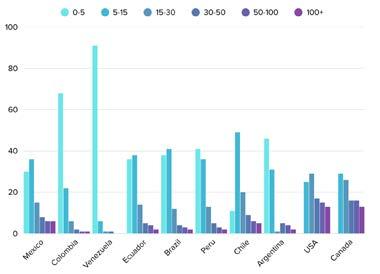
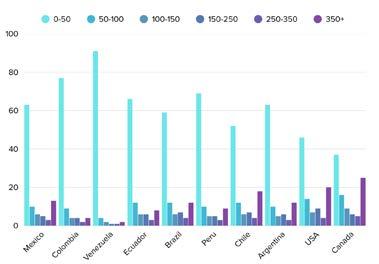

SmartSoft CEO Guga Gotsadze, Rasmus Sojmark, Gabriel Batistuta and Shota Arveladze
Hola a todos! I write this from the plane as I return home from a week in Argentina, where our partners at SmartSoft had organised an amazing football experience for their key stakeholders.
I have been spending a lot of time in Latin America lately – as have many fellow gaming execs – as the iGaming markets continue to develop and expand. It is one of the main reasons I’m so excited for the upcoming SBC Summit Americas, which is building on the success of our SBC Summit Rio in February.
Incorporating both Latin and North American markets for the first time, the event is being held in the newlyrenovated Broward County Convention Center in Fort Lauderdale and will be the largest online gaming trade exhibition held in the US - even bigger than G2E in terms of the number of solutions for online gaming businesses to be found on the show floor.
The fusion of North America and Latin America is reflected in next year’s World Cup tournament, which is being held across Canada, Mexico and the US. It will, once again, be testament to the unifying force of football.
It is little wonder then that SmartSoft used football to underpin its partner event and what a clever move it was from them. EveryMatrix, SoftSwiss, Games Global, Apuesta Total, BetWarrior, and Logifuture were among the guests for a packed itinerary.
It included a VIP experience at the Boca Juniors Museum and Stadium, a trip to Estadio Diego Armando Maradona and, the icing on the cake, tickets to watch Argentina v Brazil at the River Plate
Stadium. Given the World Champions beat their near neighbours 4-1, it meant the atmosphere was even more electric.
We also got to meet many legends of the game, including Gabriel Batistuta, Claudio Caniggia, Shota Arveladze, Jorge Burruchaga, and Oscar Ruggeri. We also met some of the current stars of Argentine football in the shape of striker Julian Alvarez and goalie Emiliano Martinez.
SmartSoft worked super-hard to capture the full spirit of Argentine football, and it was something truly special - providing a lifetime of memories.
And, as if to underline the global nature of football bringing people together, were you aware that the opening three matches of the 2030 World Cup, which boasts Spain, Portugal and Morocco as co-hosts, will be held in Argentina, Paraguay and Uruguay?
SBC has frequently used football to unify businesses. Our very first conference brand was called Betting on Football and our popular SBC Football Championships gives people the opportunity to play against their colleagues in the industry. We even had cage football on the show floor in Rio!
This is why I’m working on something that I hope will be a bit special for our Lisbon event this September. It’s ambitious and it will push the boundaries in the way in which SBC has become renowned. Keep an eye out for announcements soon.
Enjoy,
Rasmus Sojmark, Founder & CEO, SBC







